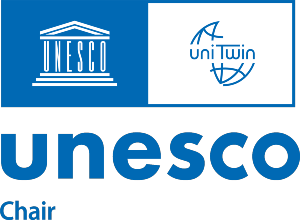24 February 2026
Supporting Science, Impacting Policy (SSIP) is an ENLIGHT+ funded international seminar series on translating research to policy. The series will explore how universities support their researchers in navigating the complex research policy interface across ENLIGHT universities to promote evidence-based policy decisions by national agencies and the government.
23 February 2026
Congratulations to Dr Bernadine Brady, who is a recipient of a New Foundations award from Research Ireland for a research project focused on exploring the experience and impact of LGBTQ+ youth work in Ireland, in collaboration with Belong To.
9 February 2026
UNESCO Chair Team Addresses Oireachtas Committee on Technology, Social Media and Children
6 January 2026
Call for Abstracts | UNESCO Child and Family Research Centre 12th Biennial International Conference | 11-12th June 2026
Shifting Power: New Frontiers in Youth Participation
1 December 2025
Professor John Canavan has been announced as the new UNESCO Chair in Children, Youth, and Civic Engagement at University of Galway.
The appointment has been marked with an inaugural lecture by Professor Canavan, entitled Advancing Knowledge and Practice to Improve the Lives of Children and Youth.
13 November 2025
Registration Now Open | UNESCO Child and Family Research Centre 12th Biennial International Conference | 11-12th June 2026
Institute for Lifecourse and Society, University of Galway
Shifting Power: New Frontiers in Youth Participation
3 November 2025
On behalf of the UNESCO Child & Family Research Centre (UCFRC), University of Galway, it is our pleasure to invite you to the Inaugural Lecture marking the formal commencement of the appointment of Professor John Canavan as UNESCO Chair in Children, Youth, and Civic Engagement.
29 October 2025
In Autumn 2025, we were delighted to launch a new, advanced empathy education module for senior cycle students in Irish secondary schools. Activating Social Empathy (ASE) is a practical classroom resource designed to help teachers promote empathy skills and understanding among Transition Year (TY) students. This new micro-module complements the existing Junior Cycle ASE resource, offering age-appropriate lessons and activities that challenge TY students to explore empathy in more complex social contexts.
23 October 2025
The Prevention and Early Intervention Network (PEIN), in partnership with the UNESCO Child and Family Research Centre, University of Galway hosted a PEI Summit in Limerick on October 23rd - 24th .
23 October 2025
We are delighted to welcome Monica Facciocchi, PhD candidate in Education in Contemporary Society at the University of Milano-Bicocca visiting the UNESCO Child and Family Research Centre, School of Political Science and Sociology.
20 October 2025
Webinar 7: Making Complexity Theory Work for you!
This webinar brings the webinar series to a close. It incorporates key learnings from the series and includes insights from our paper on complexity theory and its application to child protection and welfare, published in the British Journal of Social Work; and our recently published book, ‘Systems Complexity in Child Protection and Welfare, Policy, Leadership, Practice and Evaluation’ (Routledge, 2024). Our aim for this final session is to provide participants with a series of actionable messages on complexity theory to improve practice, services and policy.
28 August 2025
We were delighted on culture night to host the launch of 📚 Systems Complexity in Child Protection and Welfare Policy, Leadership, Practice and Evaluation at the UNESCO Child and Family Research Centre, University of Galway.
26 June 2025
Dr Brendan Dolan was invited to speak at the University Policy Engagement Network (UPEN) annual conference hosted at University of Surrey. Dr Dolan (PI) presented on a new Research Ireland-funded project exploring researcher–policymaker interactions in Ireland through the micro-level lens of the individual researcher.
27 May 2025
A Review of Meitheal, a Tusla led National Practice Model launched by Tusla - Child & Family Agency.
23 May 2025
The Discipline of Applied Social Science (DASS), School of Political Science and Sociology, University of Galway, hosted a day of discussion and reflection on the role of teaching and learning in supporting societal wellbeing at the Institute for Lifecourse and Society.
11 April 2025
New report by the University of Galway, in partnership with Rethink Ireland, which calls for a fundamental rethinking of how young people’s wellbeing can be understood and supported through education and youth mental health projects across Ireland.
27 March 2025
DATE: Wednesday, 9 April 2025
REGISTRATION: 10am
EVENT TIME: 10:30am to 2.30pm
LOCATION: Presidents' Hall, The Law Society of Ireland, Blackhall Place, Dublin 7, D07 VY24
18 March 2025
Webinar 6: Complexity Theory and the Importance of Networks
Organizations tasked with responding to child protection and welfare concerns do not function in isolation, but are instead interconnected components in a broad system of complex and non-linear networks involved in care and protection, which include domains across domestic violence, physical and behavioral health, housing and homelessness, criminal and juvenile justice, mental health, education, and a myriad of community service and social supports that intersect with child protection and welfare involved families.
12 February 2025
Staff and students from the UNESCO Child & Family Research Centre, School of Political Science & Sociology, participated in an Erasmus+ Blended Intensive Programme (BIP), Mentoring for Social Inclusion, hosted by NHL Stenden University in The Netherlands.
29 January 2025
Cillian Murphy shares acting and empathy learning with UNESCO Youth Researchers
16 December 2024
Launch of 2025-2029 UNESCO Chair programme
Following Pat Dolan’s retirement in 2024, Centre Director John Canavan was appointed to the post of UNESCO Chair in Children, Youth and Civic Engagement.
25 January 2024
Webinar 5: ‘Complexity Theory and Children’s Participation’
The task of incorporating children’s voices into institutional decision making is considered a challenge despite the widespread policy imperative to do so. Decision making is burdensome for child protection decision makers due to the number of decisions they are required to make; the dangerous nature of decisions; and the emotional imposition of those decisions. These complexities are perceived to be intensified if children’s voices are added to the decision-making process. The tendency is to try to reduce complexity , but Michail et al (2024) argue for ‘complexity absorption’, collective sharing, and multiple creative practices to incorporate the voice of children in decision-making so as to moderate the burden of child protection work.
27 September 2024
Launch of Opportunities for Youth: National Strategy for Youth Work and Related Services 2024-2028
A keynote address was delivered by Dr. Bernadine Brady, Associate Director, UNESCO Child and Family Research Centre, University of Galway at the recent launch of Opportunities for Youth: National Strategy for Youth Work and Related Services 2024-2028 by Minister Roderic O’Gorman.
6 September 2024
Strengthening Access and Inclusion: Higher Education's Engagement in Social Mentoring. Roundtable Discussion.
Thursday 19th September, 1-2.30pm. The Bridge Room,1st Floor, Hardiman Research Building, University of Galway
28 June 2024
Launch of Report on The Development of a Monitoring / Review Framework for Galway City Partnership Community Development Group Activities
24 June 2024
On 3 July Eurochild will host an international hybrid conference on the topic of mainstreaming children’s rights into decision-making through the use of child rights impact assessments. This conference is part of Eurochild’s EU-funded Building Children’s Futures project, in partnership with the UNESCO Child and Family Research Centre and Ireland’s leading organisations and government representatives for children rights.
15 April 2024
Activating social empathy in community settings is an important part of the UNESCO Chair’s work and implemented with youth work partner NGO Foroíge. Food plays a part in everyone's lives - it connects cultures, crosses borders and provides nourishment and comfort.
8 April 2024
UCFRC 11th Biennial International Conference 13-14th June 2024
Follow the conversation at #familysupportforequality
12 March 2024
Professor Pat Dolan is to be awarded the Medal of the Maria Grzegorzewska University in Warsaw for life-long achievements in the field of children’s rights.
26 February 2024
The WNW Connect Project is focused on creating and promoting accessible routes to Higher Education in the West North-West Region of Ireland through engaging with, and supporting, individuals who are socio-economically and/or educationally disadvantaged.
26 February 2024
Researchers at University of Galway have identified that young people who have suffered adversity in the home, among peers, or at school are substantially more at risk of self-harm compared to young people who are unlikely to have experienced such adversities.
22 February 2024
Launch: Building Children’s Futures: Using Children’s Rights to Recover from the Global Pandemic. The Children’s Report.
We are delighted to invite you to the launch of a new children’s research report, conducted by UNESCO Child and Family Research Centre, School of Political Science Sociology, University of Galway in partnership with Foróige, and published as part of the wider ‘Building Children’s Futures: Using Children’s Rights to Recover from the Global Pandemic’ project.
25 January 2024
Webinar 4: Complexity and Leadership
With growing complexity, it is recognised that managerial control is both less possible, and less useful in dealing with the increasing adaptive challenges that face public policy in the information age. Complexity theory has come to the fore in public sector management and leadership, challenging traditional linear hierarchical approaches.
10 January 2024
Broadening the debate: Understanding the social context of youth mental health
9 January 2024
Institute for Lifecourse and Society (ILAS) Public Policy Innovation Series: Seminar 1: Learning from experience: The Case of Irish Early Years Policy
18 December 2023
Online Information Session, January 18: MA/Postgraduate Diploma (Child, Youth & Community)
The MA/PDip in Child, Youth and Community is designed for professionals already working in or for those who have a strong interest to work in the community, voluntary or public sector.
15 November 2023
Call for Abstracts: UCFRC 11th Biennial International Conference
15 November 2023
Advance Notice: Registration Now Open, UCFRC 11th Biennial International Conference 13-14th June 2024
27 October 2023
Achieving Research Impact for Better Outcomes: Science, Society and Transformations to Educational Landscapes Event
B08, Business School, Technological University of the Shannon, Athlone Campus
Dr Rosemary Crosse presented on Understanding, negotiating and navigating the politicisation of evidence-based policy research: the case of Irish research on lone parent labour market activation policy.
26 October 2023
Workshop on Youth Involvement in Health Research in Ireland
The workshop provided a platform for sharing experiences, insights, and best practices on youth involvement methods. This workshop featured a keynote from Dr Danielle Kennan, UNESCO Child and Family Research Centre, University of Galway a renowned expert and panel discussions by researchers and youth to share their experiences alongside an interactive session with participants to explore key issues in youth involvement.
17 October 2023
MA/Postgraduate Diploma (Family Support Studies), Live Q&A, Thursday, November 30th 1:00-2:00pm with Academic Director – Dr Carmel Devaney
12 October 2023
The Prevention And Early Intervention Summit Press Release
Summit in Limerick calls on government to “invest in smoke alarms instead of spending disproportionately on fire extinguishers.”
Hosted by the Prevention and Early Intervention Network, Tusla and the UNESCO Child and Family Research Centre, University of Galway, a 2-day summit in Limerick on Sept 21 & 22, brings together people with lived experience of poverty, practitioners, policy-makers and researchers, providing a collective voice for the need to act earlier to support children and families.
12 October 2023
Dr. Cormac Forkan and Dr. Tanja Kovacic of the UNESCO Child and Family Research Centre presented their findings of a social return on investment study of Rethink Ireland's Education fund 2017 - 2020, to the NPC webinar on the 12th of September 2023.
12 October 2023
10th Anniversary of University of Galway-Tusla Joint Training Partnership
This partnership began in January 2013 and has become a core component of the Continuing Professional Development programme for Tusla staff and the scheduled programme for MA in Social Work and Family Support students.
2 October 2023
Launch of Activating Social Empathy (ASE) Junior Cycle Resource
UNESCO Child and Family Research Centre, team with partner’s Disclipline of Education, celebrating the launch of the NCCAie endorsed Activating Social Empathy Junior Cycle SPHE resource with University of Galway President Ó hÓgartaigh.
2 October 2023
Empathy in Research, Teaching and Practice Seminar
The objective of this half-day seminar was to provide University staff with an opportunity to come together to share their experiences, ideas and insights and to foster meaningful connections with others with an interest in the concept of empathy.
27 September 2023
Today marked the first meeting of Phase 2 of the Minister’s Advisory Committee on Early Learning and Child Care in the Province of Newfoundland & Labrador, Canada. Dr Sheila Garrity has been appointed to the committee advising the Minister for Education, the Honourable Krista Lynn Howell. As part of a diverse and experienced group, Dr Garrity will contribute to implementing the NL-ELCC Action Plan, in harmony with the Canada-Wide plan for ELCC.
27 September 2023
Monika Haid, graduate of the MA Early Childhood Studies, University of Galway, presented findings from the Spaces & Traces project, at the Children & Youth Perspectives Conference, Charles University, Prague, Czech Republic, on Sept 14, 2023. The project explored whether children’s meaning making, and their connection to a place, could be facilitated through digital technologies.
22 September 2023
Prevention and Early Intervention Summit
The Prevention and Early Intervention Network (PEIN), in partnership with the UNESCO Child and Family Research Centre, University of Galway hosted a PEI Summit in Thomond Park, Limerick on September 21st-22nd.
14 September 2023
Lunchtime Webinar Series
Title: Complexity Theory for better Child Protection & Welfare and Public Services
Complexity is a feature of modern public service provision. Rather than fear and seek to simplify it, we need to harness complexity. This webinar series explores complexity theory and related aspects for public service and child protection and welfare work. We aim to increase insights into how complexity theory frameworks and approaches can help practitioners, managers, leaders and academics to better understand and engage with complexity at practice, service and system levels.
14 September 2023
The objective of this half-day seminar is to provide University staff with an opportunity to come together to share their experiences, ideas and insights and to foster meaningful connections with others with an interest in the concept of empathy.
14 August 2023
Learning together how to best do participatory research
In August, Professor Caroline Mc Gregor, Dr Carmel Devaney and Dr Sarah-Anne Buckley (History) held a roundtable discussion with members of the Collaborative Forum of Former Residents of Mother and Baby Homes and Related Institutions who were Steering Group Members on the IRC/ DCEDIY funded research study on Language, Terminology and Representation related to institutions historically known as “Mother and Baby Homes”, “County Homes” and related institutions.
21 August 2023
New Book: International Perspectives on Parenting Support and Parental Participation in Children and Family Services
Edited By Dr Carmel Devaney & Dr Rosemary Crosse
4 July 2023
Professor John Canavan, Vice-Chair and Dr Carmel Devaney, Working Group Leader presented at EurofamNet Final Event.
EurofamNet co-organised the Final Event of the COST Action CA18123 together with the Spanish Ministry of Social Rights and Agenda 2030 and the Spanish Federation of Municipalities and Provinces (FEMP) on the 4th July 2023 in Madrid (Spain) and marked the closing of the Action.
3 July 2023
The Higher Education Authority (HEA) released its mid-term evaluation report on the Human Capital Initiative (HCI) Pillar 3 projects at the Convention Centre Dublin which included the University of Galway funded project Designing Futures. Designing Futures were very well represented at the event with representation on the Learner Panel by Cian Coyne, a final year Commerce student and Martin Hynes, Director of Process Development in Boston Scientific who took part in the Enterprise Partner Panel. Our project exhibition included a showcase of the Empathy Lab and our new empathy baby ‘Finn’ and Vertically Integrated Projects ‘From Bench to Bedside’ and ‘Soundscapes’.
16 June 2023
The Prevention and Early Intervention Network (PEIN), in partnership with the UNESCO Child and Family Research Centre, University of Galway is hosting a PEI Summit in Thomond Park, Limerick on September 21st-22nd.
15 June 2023
What Works for Engaging Young Adults in Youth Programming: A Case Study of the Youth as Researchers Programme
Based on the global Youth as Researchers program, this seminar will explore what motivated young people to join the program during the height of the COVID-19 pandemic. This evidence-based presentation will explore what factors hooked young people to participate in the midst of crisis and suggest ways to develop and refine current and future youth programs to ensure that the youth are interested in the programs.
3 March 2023
Join us for Live Q&A, Friday, May 5th 1:00-2:00pm, MA/Postgraduate Diploma (Family Support Studies) with Academic Director – Dr Carmel Devaney
24 February 2023
Researchers at University of Galway have compiled a report on terminology and language associated with institutions historically known as “Mother and Baby Homes”, “County Homes” and related institutions.
21 February 2023
Lunchtime Webinar Series
Title: Complexity Theory for better Child Protection & Welfare and Public Services
Complexity is a feature of modern public service provision. Rather than fear and seek to simplify it, we need to harness complexity. This webinar series explores complexity theory and related aspects for public service and child protection and welfare work. We aim to increase insights into how complexity theory frameworks and approaches can help practitioners, managers, leaders and academics to better understand and engage with complexity at practice, service and system levels.
12 January 2023
Online Information Session: MA/Postgraduate Diploma (Child, Youth & Community) with Course Director – Dr. Danielle Kennan
8 December 2022
Join us for Live Q&A, Friday, February 24th 1:00-2:00pm, MA/Postgraduate Diploma (Family Support Studies) with Academic Director – Dr Carmel Devaney
25 November 2022
Foróige and the UNESCO Child and Family Research Centre, University of Galway were joined by Minister Mary Butler for the launch of new research titled “Youth mentoring as a supportive resource for young people in CAMHS: An exploratory study”.
23 November 2022
We are delighted to announce the launch of a new project funded by the EU Commission, which the Children’s Rights Alliance is leading in partnership with the UNESCO Child and Family Research Centre, the Department of Children Equality Disability Integration and Youth, Tusla the Child and Family Agency, Eurochild, and Foroige.
10 November 2022
University of Galway, UNESCO Chair, Children, Youth and Civic Engagement Professor Pat Dolan presented a paper on Transdisciplinary in Social Sciences at the 30th Anniversary of the UNITWIN/UNESCO Programme at UNESCO HQ in Paris.
10 November 2022
Dr Charlotte Silke, Post-Doctoral Researcher with the UNESCO Child & Family Research Centre won the award for best overall research presentation at The National Suicide Research Foundation Conference on Suicide, Self-Harm and Mental Health (14 Oct) for World Mental Health Day.
10 October 2022
The UNESCO Child and Family Research Centre,
University of Galway
IONBHÁ: The Empathy Book For Ireland
Edited by Cillian Murphy, Pat Dolan, Gillian Browne & Mark Brennan
Book Launch
15 August 2022
KEEPING WHAT WORKED BEST: LIVING AND LEARNING BEYOND COVID-19
Discussion of key messages and recommendations from the Crisis Coping Project
Friday, 30th Sept 2022, @ 10:45 am - 2 pm
Aula Maxima (Ground Floor) located in the Quadrangle, NUI Galway
7 July 2022
SRA Collaboration Lunchtime Seminar
Adolescent adjustment, well-being, and individual, peer, and family contexts during COVID-19 in 3 countries
When: August 23rd, 2022 @ 1pm
Where: Institute for Lifecourse and Society, G006
10 May 2022
UNESCO Child and Family Research Centre Launches Parenting Support Research
The UNESCO Child and Family Research Centre at NUI Galway launched its research on Parenting Support along Tusla – Child and Family Agency's new 5-year Parenting Support Strategy, which will run until 2027.The new strategy is informed by the wide-ranging research project that was undertaken by NUI Galway which looked at the experiences of practitioners both in Tusla and in Tusla-funded agencies, and importantly, looked at the views and experiences of parents who were on the receiving end of support services both before and during the pandemic. The aim of the research was to explore how support services work today, how parenting supports have evolved to reflect changes in parenting, and how these supports could be better into the future.
28 March 2022
Join us for Information Session and Live Q&A
MA, PDip (Child, Youth and Community)
with
Programme Director – Dr Danielle Kennan
Thursday April 7th, 6.30-7.30pm
To register your place please visit: https://www.eventbrite.ie/e/308685876767
Join Zoom Meeting
https://nuigalway-ie.zoom.us/j/94203507321?pwd=VDJBTXlScFpVbitZQUthUUF5N1dPZz09
Meeting ID: 942 0350 7321
Passcode: 464964
21 March 2022
UNESCO Child and Family Research Centre
10th Biennial International Conference
9th & 10th June 2022
Institute for Lifecourse and Society, NUI Galway
Navigating the Future: A Compass for Youth Policy and Practice
4 March 2022
Researchers at NUI Galway are using information from young people across Galway, Mayo and Roscommon to deepen knowledge about youth mental health and suicide prevention.
The project, funded by the Health Research Board (HRB), is analysing data from 5,000 teenagers in the three counties who took part in surveys by Planet Youth in 2018, 2020 and 2022.
18 February 2022
The UNESCO Child & Family Research Centre would like to invite you to a short lunchtime webinar on the Planet Youth project (www.planetyouth.ie). Planet Youth is a local implementation, in Galway, Mayo, and Roscommon, of the Icelandic primary prevention model. Planet Youth gathers detailed survey data about mental well-being, education, lifestyles, behaviour and experiences from approximately 5,000 teenagers in the West of Ireland every two years. This webinar will introduce the Planet Youth model and highlight how the research findings and dataset can be used as a valuable resource for teaching and research.
31 January 2022
We are pleased to announce that Minister for Education, Norma Foley has appointed our colleague Dr Sheila Garrity of NUI Galway, to the NCCA Council as the nominee of Roderic O’Gorman, Minister for Children, Equality, Disability, Integration & Youth.
28 January 2022
Join us for Live Q&A
Wednesday, March 3rd 7.30pm
MA/Postgraduate Diploma Family Support Studies
with
Academic Director – Dr Carmel Devaney
25 January 2022
Navigating the Future: A Compass for Youth Policy and Practice
UNESCO Child and Family Research Centre
10th Biennial International Conference 9-10th June 2022
Follow the conversation at #compassforyouth
Call for Abstracts
Submission Deadline: March 7th 2022
9 December 2021
UNESCO Child and Family Research Centre
Books' Launch Webinar
16:15 – 17:15 GMT
1 December 2021
UNESCO Child and Family Research Centre
10th Biennial International Conference
9th & 10th June 2022
NUI Galway
Navigating the Future: A Compass for Youth Policy and Practice
Follow the conversation at #compassforyouth
13 August 2021
We are delighted to invite you to the launch of the ground-breaking evaluation of Rethink Ireland´s Education Fund, a three-year evaluation carried out by the UNESCO Child and Family Research Centre, NUI Galway.
The research findings provide evidence-based innovative approaches of projects that serve as models of excellence to overcome inequality in Education.
The official online launch will take place September 8th at 11:00am.
30 June 2021
Dr Sheila Garrity, of the UNESCO Child & Family Research Centre has been invited to contribute as an International Partner, with the Queen Maud University led research team, in the evaluation of quality of ECEC provision in the Norwegian context. The KUMBA study aims to ‘test, modify, and evaluate existing Norwegian quality assessment tools, and through this process, construct a new quality assessment system which will include both ECEC staff’s and children’s perspectives’. The three year study, funded by the Norwegian government, will commence in the autumn of 2021.
29 April 2021
The National Research Office and the Office of Services and Integration is delighted to announce the publication of the research report: A study of Tusla - Child and Family Agency’s actions and decision-making process following An Garda Síochána’s application of Section 12 of the Child Care Act 1991 by Dr Carmel Devaney, Dr Rosemary Crosse, Dr Leonor Rodriguez, and Dr Charlotte Silke of the UNESCO Child and Family Research Centre at the National University of Ireland, Galway.
29 March 2021
Institute for Lifecourse and Society
Webinar Series
Living Through Covid -19: A Lifecourse Perspective
Thursday 15th April - Thursday 20th May - 5:00-6:00pm
29 March 2021
D’Arcy McGee Beacon Fellowship Lecture:
Empathy Education: Intersectional Approaches to Youth and Civic Engagement
Date and Time: Tuesday, April 20th | 10AM (PDT) / 6PM (IST)
Presenter: Professor Pat Dolan, Dr. Derek Gladwin
Registration: https://ubc.ca1.qualtrics.com/jfe/form/SV_25MXUlVaLt9ojEq
5 March 2021
AONTAS Star Award recognises University collaboration with Galway Traveller Movement and Community Action Network
A Community Education programme at NUI Galway has won a national AONTAS STAR award after supporting adult learning for more than 20 years.
Power in Participation, a collaborative project involving the University and Galway Traveller Movement and Community Action Network has been recognised for its work with Travellers.
5 March 2021
Book launch:
Narrating Childhood with Children and Young People: Diverse Contexts, Methods and Stories of Everyday Life
This event brings together scholarly and practitioner audiences from Edge Hill University and beyond (e.g. UK, EU, US, Australia) to launch Narrating Childhood with Children and Young People: Diverse Contexts, Methods and Stories of Everyday Life.
23 February 2021
Professor Pat Dolan, UNESCO Chair and Director of the Institute for Lifecourse and Society at NUI Galway, has been awarded a prestigious D’Arcy McGee Beacon Fellowship from the Board of Trustees of the Ireland Canada University Foundation, a scholarship program which supports the development of connections between Canada and Ireland through online engagement.
8 January 2021
This first international webinar on Family Support in the European Context aims to increase awareness of Family Support as policy and practice choice for intervention with children and families. The event is hosted by the European Family Support Network EurofamNet CA 18123, which is funded as a COST Action.
7 January 2021
NUI Galway Lead Three COVID-19 Rapid Response Research and Innovation Projects
Professors Pat Dolan and Gerry Mac Ruairc will lead a project focusing on young people aged between 12 and 18 who are marginalised or are at high risk during the COVID-19 pandemic restrictions, and there is evidence that the most marginalised are becoming increasingly disconnected from school.
30 November 2020
Building Back Better: The Role of Empathy in Global Recovery Webinar and Partnership Launch
A joint webinar hosted by UNESCO Child and Family Research Centre, NUI Galway and Pennsylvania State University
Date: Wednesday 9 December 2020 Webinar
Time: 5-6.15pm Ireland/ 12.00pm to 1.15pm US
Location: Online – watch live on Facebook @NUIGalway
30 November 2020
A global UNESCO study on the impact of Covid-19 on young people’s lives is to be spearheaded by an NUI Galway professor.
More than 100 countries have signed up and 6,000 young people applied to be researchers on the international project being led by Professor Pat Dolan, UNESCO Chair and Director of the UNESCO Child and Family Research Centre at NUI Galway.
26 November 2020
The Importance of Being Present: Webinar on the importance of relationships in youth mentoring
Join us on 8th of December 2020 @ 3:30 PM CET
Are you interested in taking youth mentoring to the next level? Want to improve mentoring relationships for young people? Join our webinar as Dr. Bernadine Brady and Prof. Patrick Dolan share their perspectives and research findings to rethink and change how we view mentor-mentee relationships in youth mentoring.
4 November 2020
UCFRC Doctoral Researcher, Róisín Farragher to feature in new RTÉ documentary, My Uni Life. Beginning on Friday, 6 November, at 7.30pm, the series will run for five weeks on RTÉ One featuring seven different students and their own personal journeys to higher education.
4 November 2020
Narrative research with children: New book published by Palgrave
Narrating Childhood with Children and Young People: Diverse Contexts, Methods and Stories of Everyday Life
20 October 2020
The UNESCO Child and Family Research Centre at NUI Galway is delighted to announce a new Postgraduate Diploma / Masters of Arts in Community, Youth and Family, with an emphasis on programme planning and evaluation. The Centre has a long and established history of offering full and part-time education programmes on the topics of child, youth and family, most notably the existing BA in Child, Youth and Family: Policy and Practice and the PGDip/ MA in Family Support.
30 June 2020
A global youth-led research initiative
The Youth As Researchers (YAR) global initiative on COVID-19 connects and engages with young people to conduct research on the impacts of COVID-19 on young people and the responses young people have implemented to tackle these.
UNESCO and the UNESCO Chairs at the National University of Ireland Galway (NUIG) and Penn State University (PSU) lead a consortium of youth-led or youth-related actors to support the research through training, mentoring, and coordination.
14 May 2020
COVID-19 has created an unprecedented health crisis, disrupting the lives of thousands of individuals, as well as their societies. As this pandemic expands, young people have been amongst those mobilizing to shape new forms of solidarity, demonstrating humanism and creativity. Young people are amongst those impacted by the current crisis in terms of mental and physical health, learning and professional development, civic engagement and respect for their rights – on all these fronts young people are also facing important disruptions and changes.
27 April 2020
Ironically, even though as individuals, families, communities and countries we have ‘self-isolated’ as a result of the coronavirus, our forced disconnection may in fact lead us to be more aware of each other and connected and like never before. Across civic society we are, and will continue to be, challenged in ways heretofore unseen. Our social empathy for one another may well be the ‘vital secret sauce’ to our survival. In order to thrive, not just survive, the impact of the virus, we will need to create medical, economic and human support scaffolding to make solutions work.
5 March 2020
Dr Sheila Garrity along with Valerie Kelly in the Centre for Adult Learning and Professional Development were successful in applying for seed-funding for Learning Enhancement Projects
19 February 2020
The Youth Advocate Programme Ireland (YAP Ireland) model is a unique way of providing intensive, focused support to children, young people, and families with a range of needs, based upon the development of a trusting relationship between a supportive, trained, and skilled adult Advocate, the young person, and their family. The YAP Ireland model aims to provide an alternative to the institutionalisation of vulnerable young people, through the operation of integrated, family- and community-based programmes of support services for young people and their families in need or at risk.
12 February 2020
NUI Galway recently launched a new book which brings together theory, research and practice in relation to youth mentoring in a care context. Mentoring for Young People in Care and Leaving Care was written by Bernadine Brady, Pat Dolan and Caroline McGregor from the UNESCO Child and Family Research Centre at NUI Galway.
23 January 2020
The Importance of Empathy in Education: Researchers from the UNESCO Centre for Child and Family Research were joined by their patron, Cillian Murphy, to launch a new initiative to introduce empathy education for secondary school students in Ireland. According to UNESCO Chair, Professor Pat Dolan, "Empathy education is urgently needed in schools to curb hate speech aggression and racial and other forms of negative profiling".
22 January 2020
There is considerable evidence that informal social support provided through a high-quality mentoring relationship can help young people in care to sustain positive mental health, cope with stress and fulfill their potential through adolescence and into adulthood. We invite you to join us for a short seminar sharing currentresearch and practice relating to youth mentoring for young people in care. The seminar is hosted jointly by the UNESCO Child & Family Research Centre at NUI Galway and Foróige’s Big Brothers Big Sisters Programme.
15 January 2020
Applications are now accepted for September 2020 enrolment - closing date is 26 May 2020.
Applications and Selections - applications are made online via the NUI Galway Postgraduate Applications System https://nuigalway.elluciancrmrecruit.com/Apply/Account/Login
29 November 2019
Ombudsman for Children’s Office and UNESCO Child and Family Research Centre launch collaboration, Our Future: Voices from Transition Year.
The Ombudsman for Children’s Office (OCO) and the UNESCO Child and Family Research Centre at NUI Galway have joined forces to co-host Our Future: Voices from Transition Year, an event to mark the 30th anniversary of the UN Convention on the Rights of the Child (UNCRC).
13 June 2019
NUI Galway Conference to Highlight Changes in the Nature of Family and the Experience of Family Life
The 9th UNESCO Child and Family Research Centre Biennial conference will focus on the changing nature and meaning of family and its implications for policy and practice. The conference, entitled ‘Changing Families, Changing Policy, Changing Practice: Family Support Now and in the Future’, will take place in the Institute for Lifecourse and Society at NUI Galway from 13-14 June.
15 May 2019
Collaboration between the School of Education and UNESCO Child and Family Research Centre at NUI Galway to address young people’s education and well-being needs, 15th May 2019.
The School of Education and UNESCO Child and Family Research Centre at NUI Galway have announced a new research collaboration which will enable partnership and collaborative expertise to address key priority areas for young people’s education and well-being, in Ireland and internationally.
23 February 2019
A new study undertaken by researchers at the UNESCO Child and Family Research Centre at NUI Galway (UCFRC) assessed the attitudes and values of 700 12 to 16 year old youths in Ireland with regard to empathy, social values and civic behaviour. The study, funded by the Irish Research Council, also explored the degree to which such values and behaviours are promoted across Irish policy and curriculum. The research is among the first in Ireland to focus on the experiences of younger adolescents in relation to empathy and social values.
11 February 2019
A Report into the feasibility of conducting a longitudinal study on children in care or children leaving care within the Irish context has been published by Dr Carmel Devaney and Dr Cliona Rooney of the UNESCO Child and Family Research Centre at NUI Galway. This study was commissioned by Tusla, the Child and Family Agency (Tusla) and the Department of Children and Youth Affairs (DCYA) with the support of the Irish Research Council.
Other News Items
The following news items will expand when you click on their headlines:
13th & 14th June 2019 Institute for Lifecourse and Society

Conference Theme:
In the context of major, global social, economic and technological change, the nature and meaning of family is in flux. Among western States Ireland is particularly notable for late and rapid changes in the nature of family and the experience of family life. Most evident in recent, significant constitutional changes in children’s rights, same-sex marriage and abortion, it is also reflected in established demographic trends of ever later marriage and reducing fertility. What family means, what it means to be a family member – parent, child, sibling, grandparent – has and continues to change. New risks and challenges emerge and so too do new possibilities and capabilities. And just as family changes, policies and the work of those who support families must continually change too. Taking Ireland as an international case study, the aim of the 9th Centre’s Biennial conference is to reflect on the nature of family and family change and its implications for policy and practice. As well as focusing on current issues, we aim to anticipate future challenges and possibilities for families, and frame future responses. Through an integrated agenda of plenary papers and parallel workshop sessions, we will interrogate the issues across provisional themes of:
- Demography – fertility, migration, aging and intergenerational families
- Austerity, poverty and social exclusion
- Diversity – Migration, post-divorce and separation families,
- Supporting Families with particular needs and adversities – disability, mental health, homelessness, addiction
- Technology in the context of family
- Family in Social Policy
- Rights, citizenship, partnership and co-production
Registration is now open.
Abstract Submission is now open.
Important Dates:
Deadline abstract submission
February 28, 2019
Notification of Abstract Acceptance
March 20, 2019
End of registration at a reduced fee
March 29, 2019
For regular Conference update please visit www.conference.ie
^ Hide answer
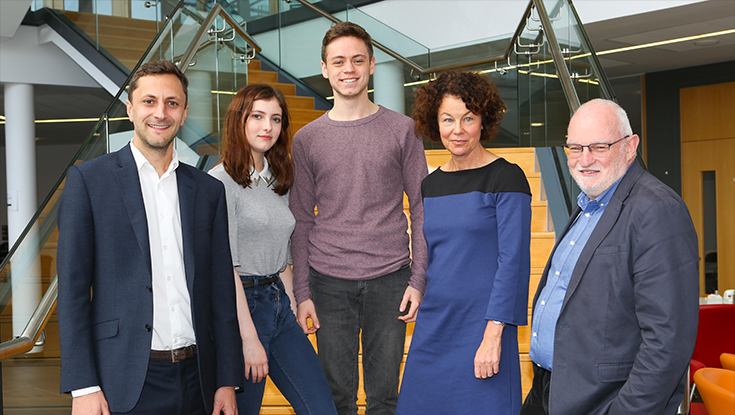
Pictured at the Lumos and UNESCO Chairs partnership results to end global institutionalisation of children are pictured l-r: Alex Christopoulos, Lumos Deputy Chief Executive, Ella Anderson and Jack Gaffey, UNESCO Child and Family Research Centre Youth Researchers, NUI Galway, Aileen Shaw, UNESCO Child and Family Research Centre and Professor Pat Dolan, UNESCO Chair, NUI Galway.
UNESCO Chairs in Children and Youth and the Lumos Foundation: Supporting Families – Alternatives to Institutionalisation
NUI Galway hosted an event yesterday (October 16) that showcased the results of the collaboration project between international children’s rights organisation Lumos, founded by J.K. Rowling, and UNESCO Chairs in the area of Children and Youth at NUI Galway and Pennsylvania State University. The partnership is working to increase global momentum to transform the lives of children separated from their families in orphanages.
The three-year project (2015-2018), funded by The Atlantic Philanthropies (Ireland), involved training 97 experienced child care and protection trainers across 14 countries who then shared their expertise with over 14,000 practitioners through workshops, training courses, conferences, events and individual sessions, with a further 19,000 practitioners reached through articles and blogs.
An estimated eight million children worldwide live in institutions and so-called orphanages, though at least 80% have living parents, most of whom could look after them with some support. Lumos is an international foundation working to end the institutionalisation of children around the world by transforming education, health and social care systems to move towards providing family-based and community care. The partnership is based on a number of shared goals including finding practical, ‘real world’ and sustainable ways to support families and children, particularly those who have been marginalised, to stay together in the community, and empowering children and families to play a meaningful role in changing attitudes and practices.
Professor Pat Dolan, Director of the UNESCO Child and Family Research Centre at NUI Galway, said: “Our work with Lumos is built on a mutual objective that governments, communities and professionals begin to move away from reliance on institutionalisation as the default solution for vulnerable children and instead, focus their resources, capacity and skills on community-based solutions.”
Alex Christopoulos, Lumos’ Deputy CEO, said: “The joint programme between Lumos and the UNESCO Chairs in Children and Youth, kindly supported by The Atlantic Philanthropies (Ireland), has played a pioneering role in helping to understand how child care and protection systems can be reformed in different contexts and cultures. With the shared goal that no child should be in an institution, the programme explored the role practitioners, communities, families and children and youth play in reforming systems – moving away from an institutional one size fits all approach, to building the frameworks, skills and resources needed to enable children to flourish in families.”
The event featured a documentary that focuses on the journey embarked upon by frontline practitioners undertaking de-institutionalisation. The film, Together we Stared at the Moon, produced by Irish filmmaker Niamh Heery, set in Bulgaria and Colombia, features the stories of practitioners who are working with alternatives to institutional care in their countries.
The partnership is part of a number of initiatives under the Global Network of UNESCO Chairs in Children, Youth and Communities. The UNESCO Chair programme offers a unique platform to raise issues at the highest levels of policy.
For further information on Lumos, visit: https://wearelumos.org/
To view a promo of the film Together we Stared at the Moon, visit: https://www.youtube.com/watch?time_continue=14&v=9w3h1kH8jng.
^ Hide answer
Mayor of the City of Galway, Councillor Niall McNelis & the UNESCO Chair in Children, Youth and Civic Engagement Professor Pat Dolan cordially invite you to the: “Dear President” Letters Launch
Saturday October 13, 2018
12:00-2:00pm
Institute for Lifecourse and Society, National University of Ireland, Galway.
-(1)-112x180.jpg)
This project was open to young people from across the Republic of Ireland aged between 15 and 18 years and not eligible to vote in this year’s Presidential Election. The young people were invited to write a letter or poem outlining what it is like for them as a young person to live in Ireland today, their dreams for a future Ireland and how they would like the President to represent them over the next term of office.
The launch will include a selection of readings from the letters.
Full Publication avail here Dear President Letters
To Register please email gillian.browne@nuigalway.ie
^ Hide answer
Analysis: in the first six months of 2018, Tusla dealt with almost 19,000 children and young people but there is room for improvement and development
By John Canavan and Carmel Devaney, NUI Galway
Prevention and early intervention are ideas that have both a common-sense acceptance and a well-established evidence basis in medicine and health services. Research evidence on its role in social and educational services is also becoming more extensive and of a higher quality.
However, much less is known about its value in child protection and welfare services. With colleagues at the UNESCO Child and Family Research Centre, we have produced internationally-leading research that demonstrates the role of prevention and early intervention in protecting children and supporting families.
One key message from this research is that it is possible to make a difference in the lives of children, young people and families by providing early help, particularly if it has three core characteristics. Firstly, it needs to be provided in a way that gives the power to children and parents to express what they think their issues are and what they think would be helpful to them. Secondly, it is timely, provided when and as the families need it. Thirdly, it is easily accessed in local centres or their own homes and at a time that works for them.
The UCFRC research tracked a major programme of Prevention, Early Intervention and Family Support (known as Partnership, Prevention and Family Support, PPFS) undertaken by Tusla, the Child and Family Agency from 2015 to 2018. The programme seeks to transform child and family services in Ireland by providing services which are provided when and where families need them, are responsive to the difficulties families are having and include the views of family members.
The programme has five distinct but complementary and interwoven components: Parenting Support and Parental Participation; Public Awareness (increasing awareness of where to access help among the general public); Children’s Participation (enhancing child and youth participation at all levels of their involvement with Tusla); Commissioning (the funding of services) and the development of the ‘Meitheal’ model.
The Meitheal model is Tusla’s flagship programme for providing early help and is embedded within the organisation’s area-based approach to working with children, young people and their families. The model aims to ensure that the needs and strengths of children and their families are identified, understood and responded to in a timely way so they get the help and support needed.
Our research shows that Tusla is getting better overall at providing early help. More widely, the culture and practice of Tusla is changing and it is becoming more preventative in focus and inclusive of parents and children. The research is showing that Meitheal is welcomed by families and is making a positive difference to their lives. Importantly Meitheal is improving outcomes for children and young people over time, particularly from the perspective of mothers. Maternal well-being was the most significant predictor of family outcomes suggesting that supporting mothers is key to supporting families.
Over time, this approach may help reduce the numbers of children and young people entering Tusla’s child protection system as families ask for and receive help at an earlier stage with any difficulties they are experiencing. The study also demonstrates good work by Tusla, benchmarked against international best practice, in listening to and including children, in its policies and the capacity of the front-line workers.
The research indicates promising results from Tusla’s work in supporting parents through its Parent Support Champions programme. While the public’s awareness of Tusla increased over the study, the research findings have shown that families turn to and depend on family and close friends in the main for help and support.
Minister Katherine Zappone must back Tusla in spirit and with resources to realise the early promise of the Partnership, Prevention and Family Support programme
As with all services, there is plenty of room for improvement and further development in the Partnership, Prevention and Family Support programme and our research highlights these areas. This programme does not contain a magic wand and will not solve all issues families face, but it is showing positive results which need to be continued. One key issue for Tusla is to find a way to communicate its fundamental, unequivocal responsibility to protect children, alongside its role in providing help to children and their parents as early as possible.
Beyond this, the Minister for Children Youth and Family Affairs, Katherine Zappone and her department must back Tusla in spirit and with resources to realise the early promise of the PPFS programme. Tusla note that almost 19,000 children and young people received a family support service from January to June 2018. The minister needs to leverage the engagement of other departments and relevant agencies (such as Health, Education, Justice, and the HSE) to ensure all front-line professionals working to help those 19,000 children, young people and their families are doing so together.
^ Hide answer
The UNESCO Child and Family Centre at NUI Galway has finalised a four-year study that has found significant improvements in Tusla’s Prevention, Early Intervention and Family Support services. The reports were launched with Tusla-Child and Family Agency today (13 September 2018) in Dublin.
In 2016, 47,399 child protection and welfare referrals were made to Tusla-Child and Family Agency, and 6,267 children and young people were in its care in 2016. More and better prevention and early intervention is needed to reduce these numbers.
Key Report Findings
- Overall, the research shows Tusla is getting better at providing early help for children, young people and their families.
- Significantly, the research is showing that Tusla’s flagship new programme for providing early help, Meitheal, is welcomed by families and is making a positive difference to their lives. When fully in place, the system may help reduce the numbers entering the child protection system.
- Importantly Meithealis improving outcomes for children and young people over time, particularly from the perspective of mothers. Maternal well-being was the most significant predictor of family outcomes suggesting that supporting mothers is key to supporting families.
- The study also demonstrates good work by Tusla, benchmarked against international best practice, in listening to and including children, in its policies and the capacity of the front-line workers. There is strong evidence of children and young people’s participation being embedded across Tusla.
- The research results indicate promising results from Tusla’s work in supporting parents through its innovative Parent Support Champions programme.
- Overall, while the public’s awareness of Tusla increased over the four-year study, the research findings have shown that in the main, families turn to and depend on family and close friends for help and support.
The NUI Galway research reports concluded that the culture of Tusla is changing and that it is becoming more preventative in focus and inclusive of parents and children. This is demonstrated across the work of the Prevention, Partnership and Family Support programme.
The research also identified areas for improvement across the programme. Ongoing organisational support and funding is needed to ensure that the PPFS is fully operational across all Tusla areas. There is a need for greater awareness of programme components (Meitheal, children’s participation, parenting support) across the wider organisation. The general public need to be made more aware of Tusla’s prevention, early intervention and family support within its full service offering. More is to be done on integratingthe programme fully within Tusla’s organisation and in day-to day-operations, and in connecting the Meitheal programme in particular with other agencies and government departments. The individual research reports indicate changes, adaptations and improvements in each of the programme areas.
The research is contained in six research reports (see link below):
- Meitheal and Child and Family Support Networks
- Children’s Participation
- Parenting Support and Parental Participation
- Commissioning
- Public Awareness
- Systems Change
Dr John Canavan, Associate Director and Senior Lecturer from the UNESCO Child and Family Research Centre at NUI Galway, said: “Our research demonstrates that Tusla has developed and implemented a national programme of work that should increase the numbers of children and families receiving early help to prevent problems they face getting worse. It also demonstrates that Tusla is putting in place systems, training and procedures to ensure that its meets its responsibility to listen to and act on the views of children.”
Dr Carmel Devaney, lead researcher from the UNESCO Child and Family Research Centre at NUI Galway, said: “With regard to help-seeking for a parenting or family problem, personal support networks, family and friends, were the main source of support for the public. Members of the public turned to their local GP primarily if they could not manage a parent or family problem, while increasing numbers of people are asking a teacher for assistance in this area. Family members also reported their appreciation of being included in the process of identifying their needs and in deciding on a helpful response to these. Children and young people highlighted that they felt listened to with some noting improvements in their lives as a result of taking part in Meitheal.
“Our findings also suggested that both the public and the media do not clearly differentiate the concept of family support from child protection, and children in care. And 98.5% of the population confirmed they had received services from Tusla when they sought them this year.”
Speaking at the launch, Tusla Chief Executive Fred McBride, stated: “The Prevention, Partnership and Family Support (PPFS) programme is growing, and with our Tusla National Child and Family Support Week promotional campaign underway from September 17-23, we hope that even more people will seek help from our range of family support services. Staff at the UNESCO Child and Family Research Centre have been at our side to develop, and critically assess the PPFS programme. This work provides us with a rich understanding of the PPFS programme and it’s potential. The research carried out by NUI Galway has been executed in an academically robust and systematic manner, and provides us with a clearly defined body of knowledge that allows us to examine what we are doing, and why we are doing it.”
To read and download the full research reports, visit: http://www.childandfamilyresearch.ie/cfrc/mainstream/ourworktodate/
^ Hide answer
Youth Researchers Present Their Work on the “YES Project”
The Youth Researchers Event is a collaboration of UNESCO and Prof. Pat Dolan, Director of the UNESCO Child and Family Research Centre at NUI Galway. The work that will be presented derives from the Mayo Child and Young Person Advisory Committee, an initiative between Foróige and the Tusla Child and Family Agency. These young researchers, trained and supervised by the UNESCO Chair at NUI Galway, have set out to understand how youth are helped and heard. Specifically, the research investigated young people’s knowledge of the family support services ‘’Tusla’’ and how young people would like to receive information on these services.A group of 16 youth researchers and 2 chaperones will travel to UNESCO Headquarters on July 10, 2018. They will present their findings, from an in-depth literature review and a survey of 248 young people during a one-hour event. The team found that 64% of young people were unsure of what the social service Tusla was, and 74% did not know what family support is. They recommended that information aimed at teens should be put online and on social media as well as posters and leaflets. In addition to the 16 young researchers and their chaperones, the event will include an invited audience of approximately 15 UNESCO staff and fellows. This research and the opportunity for young researchers to present their findings at UNESCO is in line with the UNESCO Operational Strategy on Youth; it will enhance youth civic engagement, democratic participation and social innovation. Furthermore, the presentation of these findings will directly inform the Youth PVE team’s work on empathy education and youth development. Finally, this visit will inform continuing and future collaborations between UNESCO and the UNESCO Child and Family Research Centre.
^ Hide answer
A study of youth mentoring in the context of youth justice (the BBBS-GYDP Project) undertaken by Ms Kayleigh Murphy and Dr Bernadine Brady of the UNESCO Child & Family Research Centre was launched by Foróige in Dublin on July 3rd. David Stanton, Minister of State for Equality, Immigration and Integration and Garda Chief Superintendent Colette Quinn were Guests of Honour at the event. The study was funded by the Irish Research Council and Foróige under its Employment Partnership Scheme.
A summary of the research findings can be accessed here:
Pictured at the launch of the BBBS-GYDP research in relation to experiences of youth mentoring in Garda Youth Development Projects, were:

L-R: Kayleigh Murphy and Dr Bernadine Brady, Researchers, UNESCO Child & Family Research Centre, NUI Galway, John Cahill, Foróige, Minister David Stanton, Sean Campbell, Foróige, Garda Chief Superintendant Colette Quinn.
^ Hide answer
UNESCO International Honorary Biennial Lecture
Professor Ciarán Ó hÓgartaigh, President of NUI Galway
and Professor Pat Dolan, UNESCO Chair in Children,
Youth and Civic Engagement
will host the
UNESCO International Honorary Biennial Lecture 2018
by
Ms Toni Preckwinkle, President, Board of Commissioners, Cook County, Illinois
entitled Reform in Cook County and Juvenile Justice
Event details: Date: Tuesday, 22 May 2018 Time: 14.30 Venue: Aula Maxima Lower, Quadrangle, NUI Galway
President Toni Preckwinkle
Toni Preckwinkle is the 35th president of the Cook County Board of Commissioners, an office she has held since 2010. A dedicated and effective public servant, President Preckwinkle has worked collaboratively to reshape County government through increased fiscal responsibility, transparency and improved services.
As the top executive in Cook County, President Preckwinkle oversees one of the nation’s largest public health and hospitals systems and one of the nation’s largest criminal justice systems. She is a lifelong advocate for equity and equality, and through her work as president, has fought to improve health care access, bring increased fairness to the criminal justice system and expand employment training opportunities for some of the County’s most disadvantaged youth.
President Preckwinkle is a nationally recognized leader in the drive to reduce unnecessary and costly incarceration of non-violent offenders in the criminal justice system.
Before she was elected Cook County Board President, President Preckwinkle served 19 years as Alderman for the 4th Ward in Chicago, building a reputation for progressive independence. She replaced failed public housing with viable mixed-income development. Prior to holding elected office, President Preckwinkle taught high school history for 10 years. She holds bachelors and masters degrees from the University of Chicago. She is the mother of two and the grandmother of three.
Register here.
.bmp)
^ Hide answer
“Practice Research in Child Welfare Studies”
International Summer School Monday 13th - Tuesday 14th August 2018
Location: Institute for Lifecourse and Society, NUI Galway
Hosted by Professor Caroline McGregor, UNESCO Child and Research Centre, NUI Galway, Professor Mirja Satka, Heikki Waris Institute, Helsinki supported by the Special Interest Group of the European Social Work Research Association on Practice Research
REGISTER HERE
About the Summer School:
The focus of the summer school is Practice Research in Child Welfare Studies. The aims of the School are to:
- Provide a platform for researchers, graduate students and practitioners interested in the field of practice research and child welfare to learn more about practice research methods.
- Offer keynotes from experienced practice researchers to stimulate thought and discussion.
- Provide participants with the opportunity to develop their own work in this field by working on a project or a paper as part of the summer school.
- Create a dynamic and inspiring learning environment for peer learning on practice research.
Participants: Researchers, students (MA/PHD) and practitioners interested in the field of Practice Research relating to Child, Youth and Family Social Work, Social Care and Social Policy.
Requirements for Participation:
Participants are expected to be researchers, graduate students or child welfare practitioners with an interest in or involvement in research within their field. They should bring a research idea or project to the Summer School to work on. They should be prepared to present their ideas/project phase and engage in planning and discussion with colleagues to develop it. The work can be a new idea or something already progressed.
Registration Fee : €125
Discounted Student Rate: €100
DEADLINE FOR REGISTRATION IS WEDNESDAY 25TH JULY

^ Hide answer
“Engaging Urban Youth: Community, Citizenship and Democracy”, workshop will take place on the 12th March 2018 at the Institute for Life Course and Society, NUI Galway between 11am – 3pm. This is part of a wider stakeholder engagement process which is being held in Galway, Dublin, Belfast and London.
The aim of the project is to highlight how best we can successfully engage young people, particularly those from disadvantaged or marginalized backgrounds, in civic and political life. The main aim of the study is to explore how young people from 3 cities (London, Belfast, and Dublin) engage with civic and political systems and how best to promote their positive engagement. We worked with colleagues in Galway as a pilot site for the project. The research included an investigation of the policies, organizations, and programs that seek to promote youth civic and political engagement and the views and experiences of young people themselves.
The aims of the workshop are to:
- Present main findings so far and consult with colleagues about them.
- Seek feedback and comments on the findings to inform our final report.
- Discuss possible recommendations for practice and policy at the local, national, and international level.
The format of the workshop will include presentations of study findings followed by focused discussion. We would very much welcome your participation in the workshop, which will inform our finalization of the report and elaboration of key recommendations. Please feel free to invite others whom you think would be interested to attend and ask them to register.
To register, click on the Eventbrite Link here : Galway Consultation Workshop - 12 March 2018
Closing date for Registration is the 7th March 2018.

^ Hide answer
The UNESCO Child and Family Research Centre at NUI Galway today (1 February 2018) hosted a Youth Empathy Day. The youth-led day brought together 200 Transition Year students from six secondary schools in Galway, Dublin and Tipperary, all of whom are taking part in a new pilot education programme called Activating Social Empathy, which supports adolescents to learn empathy in schools. Actor and Patron of the Centre, Cillian Murphy spoke to the students about the importance of empathy in his work as an actor.
Students attending the Youth Empathy Day travelled from CBC Monkstown in Dublin; Comeragh College, County Tipperary; Grange Community College, Donaghmede, County Dublin; Dominican College Galway; Stratford College, Rathfarnham, Dublin and Galway Community College.
Research shows that empathy is linked to a range of positive effects in young people from reduced prejudice and aggression to better academic performance. Empathy education in schools aims to help reduce bullying, discrimination, racial profiling and violence, and increase young peoples’ sense of belonging in school. At the highest international level empathy education has been identified by the UN Youth Office, UNESCO and UNICEF as key to preventing youth radicalization leading to extremist violence, an issue which has not been considered enough in Ireland.
Activating Social Empathy was developed by the UNESCO Child and Family Research Centre in collaboration with Foróige, and it is being piloted in Ireland as the lead version of the programme which forms part of an international project strongly backed by UNESCO that will see the programme rolled out the US, Canada, Nigeria, Myanmar, France, Cameroon and Tunisia.
Today’s youth-led event is about youth participation and listening to the youth voice on empathy in their own lives. Cillian Murphy, the Patron of the Centre, took part in a Q&A on empathy in his work as an actor and how having a capacity to empathise with the characters you play is vital. A series of workshops on literature, drama, music, yoga, mindfulness and social media will explore how these areas can be used to teach and promote empathy. Two of the Centre’s Youth Researchers will host a peer-led session on their own experience of developing empathy. The day will close with a group brainstorm on developing an Empathy Charter that can be carried into schools, setting out how empathy can be fostered within school communities.
Speaking about the event, Cillian Murphy, Actor and Patron of the UNESCO Child and Family Research Centre at NUI Galway, said: “You can’t really be an actor without employing empathy as a very important tool in your arsenal. If I can help young people to see that everyone has a different story and everyone’s story is valuable, hopefully that will help them in the future. It’s helping kids help themselves. It seems to me that if we’re going to help or encourage young people to behave in a certain way, then they should be at the forefront of it, and they should be telling us how they feel and telling us what they need, which is what this day is about.”
Professor Pat Dolan, Director of the UNESCO Child and Family Research Centre at NUI Galway, said: “We are on the cusp of the development of empathy as a core part of education systems which will benefit not just youth but civic society as a whole. Empathy education is now being recognised as vital to education, something that is part of youth wellbeing development, but goes far beyond this by changing behaviours and promoting action, with radical implications for social connection and social solidarity.”
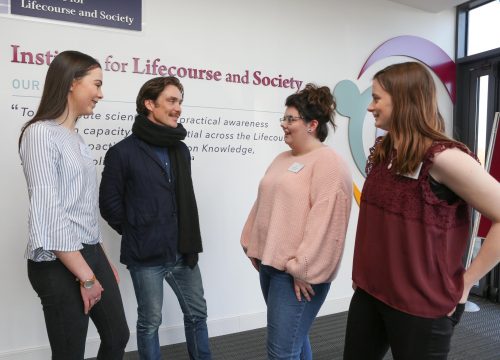
Cillian Murphy, Actor and Patron of the UNESCO Child and Family Research Centre at NUI Galway, pictured with l-r: NUI Galway Youth Researchers; Sarah O’Roarke, Creggs, Co. Roscommon, Aisling Dunphy, Carrick-on-Suir and Ciara Beth Ní Ghríofa, Athenry, Co. Galway, at NUI Galway’s Youth Empathy Day. Photo: Aengus McMahon
^ Hide answer
The Happy and Healthy Volcano Poster explains to parents what children need to be happy and healthy
Happy & Health Volcano
Tuesday, 13th March, 2018: The Roscommon Children and Young People’s Services Committee launched the Happy and Healthy Volcano Poster in the Abbey Hotel, Roscommon last Friday (9th March). The poster was an outcome of a consultation process undertaken to find out the needs of children within the Roscommon area. The poster was developed to act as an easy reminder for parents on what keeps their children happy and healthy.
The consultations took place in early 2017 in six Preschools in the county. In total, 15 consultation sessions took place involving 120 children (aged 3 ½ - 4 years) with support from the staff in the services. The theme of the consultation was ‘What do young children in Co. Roscommon think would help them to live healthier, happier and more active lives?’
Some of the findings included:
- Children need hugs and cuddles from grownups who care about them,
- Children need to spend time with Mammy and/or Daddy having fun,
- Children need to drink lots of water and eat lots of fresh fruit and vegetables
The Ombudsman for Children, Dr. Niall Muldoon opened the event and said, "If we are to provide younger children with the standard of services that they deserve, we have to listen to what they have to say. We also have to be ready to challenge ourselves to take what they say on board. This work is a great example of how this can be achieved".
The event participants also heard about research carried out with parents in the County in terms of what their needs are. The main findings from this research were that parents need support on breastfeeding and promoting healthy eating, more playgrounds to encourage physical activity, more parent and toddler groups in the County and support for parents who are isolated.
Speaking at the event Dr. Phil Jennings, Director of Public Health and National Lead Healthy Childhood Policy Priority Programme, HSE said, “Our early childhood experiences help develop our capacity to learn, get along with others and to respond to daily stresses and challenges. A good foundation in the early years makes a difference through adulthood and this is why this work in Roscommon is so important".
Dr. Sheila Garrity Lecturer in Early Childhood Studies, National University of Ireland, Galway who was also speaking at the event, commented "We are learning all the time what well-being is and how we can preserve it. We are building a compelling evidence base for what works and a huge part of this involves listening to children and what they have to say".
This work will inform the development of the first Health and Well-being Plan for young children in County Roscommon and was made possible with funds from the Children and Young People’s Services Committee and Healthy Ireland.

L-r: Caroline Duignan Coordinator, Roscommon CYPSC and Doctoral student at UCFRC, Marie Gibbons, Researcher, CYPSC Galway and Roscommon, and Doctoral student at UCFRC, Niall Muldoon Ombudsman for Children, Sheila Garrity, NUI Galway , Lorraine Mc Gowan Healthy Ireland Project Worker Dr Phil Jennings, HSE National Healthy Childhood Programme Lead/Director of Public Health
^ Hide answer
25th Anniversary of the UNITWIN/UNESCO Chairs Programme
Professor Pat Dolan recently participated as a co-moderator at the 25th anniversary of the UNITWIN/UNESCO Chairs Programme, celebrated during the 39th session of the General Conference of UNESCO, Paris, 31 October 2017.
This event hosted representatives of over 200 UNESCO Chairs, National Commissions and UNESCO, from 48 countries from all the regions of the world. UNESCO launched the Programme with the purpose of strengthening international co-operation between higher education institutions through twinning and networking arrangements and to foster academic solidarity in favour of developing countries and countries in transition.
Since its creation, the Programme has met with great interest from Member States and continues to develop steadily. From some 17 Chairs established in 1992 the number has today surpassed 700 established Chairs and interuniversity networks. These projects are located in some 116 countries and involve thousands of academics, scholars and graduate students, as well as key partners from civil society and the economic sector.
Today UNITWIN Programme is one of the main thrusts and most important downstream activities of UNESCO’s programme in higher education. The Programme provides an opportunity for the higher education and research community to join forces with UNESCO to contribute to the implementation of its programmes and the achievement of the Sustainable Development Goals.
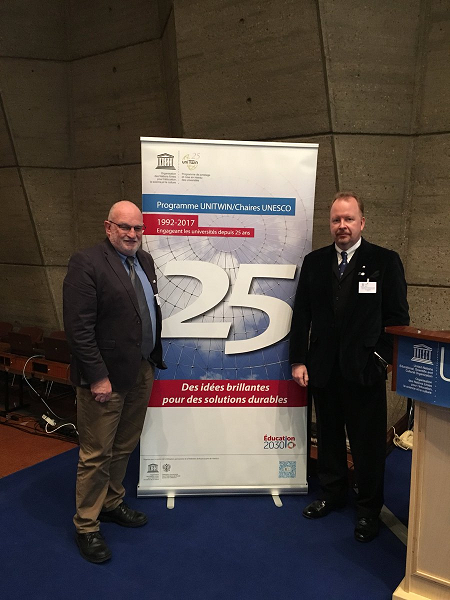
(L-R): Professor Pat Dolan, Director, UNESCO Child and Family Research Centre & Professor Mark Brennan, UNESCO Chair in Community, Leadership, and Youth Development The Pennsylvania State University
^ Hide answer
Researchers from the UNESCO Child and Family Research Centre at NUI Galway have published their latest research findings based on the experiences of children, young people and their families involved in Meitheal*, the Tusla-led early intervention national practice model. The research is part of a comprehensive programme of early intervention and preventative work undertaken by Tusla as part of the Prevention, Partnership and Family Support (PPFS) Programme.
This research provides an overview of the interim findings of the report entitled, ‘Meitheal Process and Outcomes Study’, for which data collection is ongoing. This is a longitudinal study with three waves of data collection that focuses on gathering data at a pre, post and follow-up stage. This report focuses specifically on data gathered on the implementation and impact of Meitheal.
The NUI Galway study shows that families benefit most when there is a trusting relationship with the practitioners supporting them, when they are asked their views about what is causing the difficulties and what would help resolve these when agencies work together. It is important to understand the strengths and needs of the wider family and not to concentrate solely on the child or young person in question experiencing difficulties. The research also shows that the mothers’ well-being has a big impact on the well-being of children and young people.
This research was carried out by Dr Carmel Devaney, lecturer and principal investigator on a number of research and evaluation projects under the Prevention, Partnership and Family Support Programme, and postdoctoral researchers Dr Leonor Rodriguez and Dr Anne Cassidy at NUI Galway.
Speaking about the study, Dr Carmel Devaney said: “The findings highlight the importance of the supportive empathetic relationship between practitioners and families. Family members also reported their appreciation of being included in the process of identifying their needs and deciding on a helpful response to these. Children and young people highlighted that they felt listened to, with some noting definite improvements in their lives as a result of taking part in Meitheal.
“While it is too early to determine the impact of Meitheal on the system of help provision in the Irish context, its introduction has heightened the visibility of the work that Tusla carries out with families who do not meet the threshold for an intervention by Child Protection and Welfare services.”
This report is part of the wider programme of research and evaluation that the UNESCO Child and Family Research Centre at NUI Galway are involved with, in relation to Tusla’s Programme of Prevention, Partnership and Family Support. Further research on the impact of Meitheal and its outcomes will be published in mid-2018.
To read the report in full, visit: http://www.childandfamilyresearch.ie/cfrc/publications/policyreports/
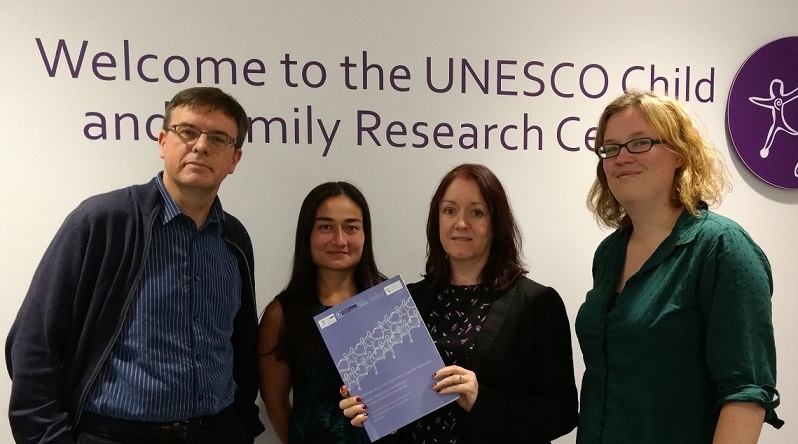
Picture (L-R): Dr John Canavan, Dr Leonor Rodriguez, Dr Carmel Devaney and Dr Anne Cassidy, UNESCO Child and Family Research Centre, NUI Galway. Photo: NUI Galway
^ Hide answer
Ciara Beth Ni Ghriofa, Youth Researcher at the UNESCO Child and Family Research Centre presented her work on empathy education and youth research at the 10th UNESCO Youth Forum hosted at UNESCO Headquarters in Paris, between 25th-26th October 2017.
The Forum brings together expert youth from all regions of the world to discuss pertinent issues related to UNESCO fields of competence that they would have identified during a preparatory phase earlier in the year.
Since 1999, the UNESCO Youth Forum has provided an innovative, ongoing opportunity for youth to work in dialogue with UNESCO, to shape and direct the Organization’s approach and to present their concerns and ideas to Member States.
Picture: Ciara Beth Ni Ghriofa, Youth Researcher, UNESCO Child and Family Research Centre
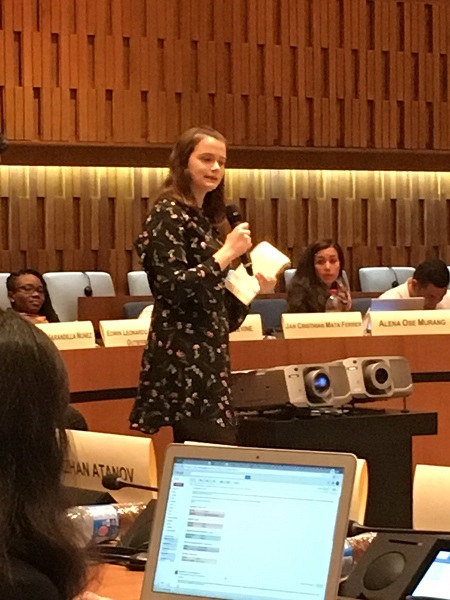
^ Hide answer
A new book by Professor Pat Dolan, the Routledge Handbook of Global Child Welfare, was officially launched at the House of Lords in Westminster, London on Tuesday 17 October by Doreen Elizabeth Massey, Baroness Massey of Darwen and Labour member of the House of Lords.
Briefings were presented at the Launch by Professor Pat Dolan, Director of the UNESCO Child and Family Research Centre at NUI Galway, Professor Jenny Pearce, University of Bedfordshire, Georgette Mulheir, Lumos Foundation (whose founder and President is the Harry Potter author, J.K. Rowling) and Professor Nick Frost, Leeds Beckett University.
Drawing on eminent international expertise, the book offers a coherent and comprehensive overview of the policies, systems and practices that can deliver the best outcomes for children. It considers the challenges faced by children globally, and the difference families, services and professionals can make.
(L-R): Professor Nick Frost, Leeds Beckett University & Professor Pat Dolan, Director, UNESCO Child and Family Research Centre
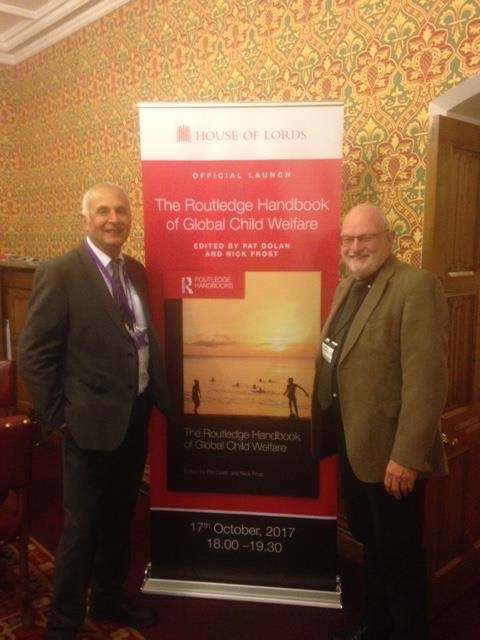
^ Hide answer
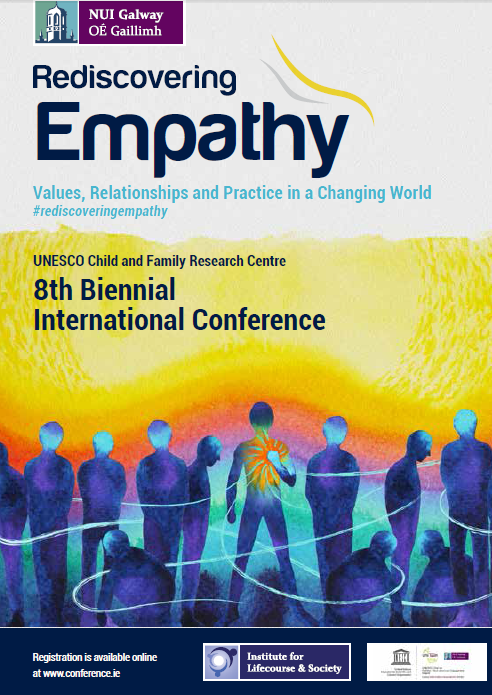
NUI Galway conference will focus on the perceived decline in empathy, care and social solidarity, which is both an Irish and global concern among youth radicalisation
Are empathy, care and social solidarity in decline and what are the consequences of this in Ireland and globally? These are some of the questions to be addressed at the UNESCO Child and Family Research Centre at NUI Galway when it hosts its 8th Biennial International Family Support Conference in June.
The role of compulsory empathy education to address radicalisation among youths will also be a key focus at the NUI Galway conference. Violent extremism is a threat that knows no borders as witnessed from the recent horrific attack at Manchester Arena, again highlighting the vulnerability of innocent children.
There are currently 1.8 billion young people between the ages of 10 and 24 in the world. This ‘youth bulge’ is the largest youth population ever. One out of 10 of the world’s children live in conflict zones and 24 million of them are out of school. Political instability, labour market challenges and limited space for political and civic participation have increased the pressures on young women and men in societies across the world, deepening their vulnerability to violent extremism. Any lasting solution to prevent violent extremism must place youth at the forefront. Young people are the most affected by multiple and often interlinked forms of violence - they also play vital roles as agents of positive change, which must be nurtured and empowered, through skills, training and new forms of educational engagement.
Speaking in advance of the Conference, Professor Pat Dolan, UNESCO Chair of the Child and Family Research Centre at NUI Galway, commented: “We know that empathy education is now recognised as one of the key ingredients in the prevention of youth violent extremism. Ireland should not be complacent about this serious issue and needs to lead the way in the development of empathy education in schools. This is no longer just an issue in the UK, France and Belgium, it also has real resonance for Ireland, and the challenges of intolerance, hatred and fear is now a global humanitarian crisis.
“Through UNESCO and global counter-extremism organisations, we have worked with youths who were formally radicalised. Through an empathy education programme such as ours these youths are no longer engaged in radicalised thinking and have now become activists for peace.”
Professor Dolan continued: “From hate crime including racism, bullying, and all the way to violent youth extremism – the enablement of empathy belonging to cultural integration in the lives of young people in Ireland is a key part of the true, and only long-term solution. Empathy education should be specifically provided in schools and part of compulsory education – it is no longer a matter of choice but a necessity.
“While for society, there is an urgent need for empathy informed policy and action to address structural inequalities and disparities, a guarantee that professionals working with children and youth demonstrate empathy and compassion is assumed, and it should not be. It is time to reassess the role of empathy among professionals including social workers and teachers.”
UNESCO’s role in promoting education as a tool to prevent violent extremism are already underway with the following activities currently being implemented.
- The promotion of Youth and Parliament – youths working in partnership with Government and agencies.
- Building peace in the minds of men and women.
- A Teacher’s Guide on the ‘Prevention of Violent Extremism’ is in development to provide guidance and practical tips to teachers on how to manage classroom discussions on radicalisation and prevent violent extremism.
- Work is in progress to tackle the importance of social media in promoting violent extremism. Global research studies are being carried out to examine the role of social media in processes of radicalisation. Policy guidelines are being developed on digital citizenship to identify, advocate and promote values, which can guide responsible online behaviour.
- The promotion of holistic and humanistic visions of learning, which convey values for just and inclusive societies, a set of multimodal online modules on violent extremism are being developed that are promoting critical thinking and enquiry-based learning from the perspective of global citizenship.
High level keynote speakers from Canada, India and Ireland will lead the discussions, while Irish and international practitioners and researchers will provide 36 workshops on key conference themes. A special talk will be given by Fr Peter McVerry SJ, social activist and advocate for those who have no voice in society.
The conference is entitled ‘Rediscovering Empathy; Values, Relationships and Practice in a Changing World’ and will touch on topics from Emotional Intelligence to Social Justice, and will address the need for empathy education in schools. It will take place in the Institute for Lifecourse and Society on the North Campus at NUI Galway on 8 – 9 June.
For more information and to register for the Conference, visit: http://conference.ie/Conferences/index.asp?Conference=491
-Ends-
^ Hide answer
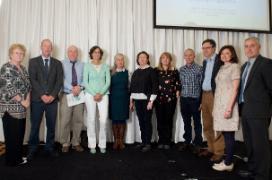
On Monday the 15th of May 2017, the launch of ‘The Evaluation of the Mol an Óige Common Sense Parenting Programme’ took place in Kiltimagh, Co. Mayo.
Responding to a specific need for parenting and family support in Co. Mayo and Co. Roscommon, the Mol an Óige Common Sense Parenting (CSP) programme is a parent-training intervention. First implemented in Co. Mayo and Co. Roscommon in 2009, CSP targets a mix of the general parent/guardian population and other at-risk groups. Its purpose is to teach parents practical and effective ways to enhance their parenting skills and strengthen their children’s potential and quality of life, the programme also equips participants with practical and effective skills which they can use to improve their parenting and family relationships.
The evaluation, undertaken by Mr John Reddy and Dr John Canavan from the UNESCO Child and Family Research Centre, NUI Galway in partnership with Tusla, Child and Family Agency, assessed the effectiveness of CSP for improving participant parenting, child behavior and the quality of family relationships. This research provides evidence of the success of the CSP programme in an Irish context. Findings suggest that core components of the programme involve both the teaching of effective parenting skills and the enhancement of participants’ confidence through the group process. In the areas where CSP was implemented, the study found consistent positive changes, and changes maintained over time, on child behavior and parenting.
The launch was attended by Mr Fred McBride, CEO of Tusla, researchers from the UNESCO Child and Family Research Centre, CSP facilitators and the Parents that took part in the study. The full report is available at: www.nuigalway.ie/childandfamilyresearch
^ Hide answer

‘Empathy, Caring and Connection among Early Adolescents: An Empirical Analysis by the UNESCO Child and Family Research Centre (UCFRC)
The UNESCO Child & Family Research Centre has recently been awarded €100,000 in funding by the Irish Research Council for a study entitled Empathy, Caring and Connection among Early Adolescents: An Empirical Analysis. The funding bid was led by Dr Bernadine Brady, Prof, Pat Dolan and Dr Brian McGrath and was awarded following a response to an open call from the Irish Research Council for ‘Research to Address Issues of National Societal Importance’. This study aims to generate empirical evidence regarding the values and experiences of Irish youth towards a range of issues which reflect a sense of social and political responsibility towards others, including an analysis of factors (including parental attitudes, school culture and community engagement) that influence the development of social values and empathy.This evidence will inform the development of policy interventions in the area of education and child and youth development. A post-doctoral researcher will be employed from April 2017 for 18 months to undertake mixed methods research with 13-15 year olds in a nationally representative sample of schools.
Longitudinal study on children in care or children leaving care within the Irish context.
The UNESCO Child & Family Research Centre has also recently been awarded €50,000 in funding to carry out a research study to consider the feasibility of conducting a longitudinal study on children in care or children leaving care within the Irish context. The funding bid was led by Dr Carmel Devaney and was awarded following a response to an open call from the Irish Research Council. As part of the IRC Research for Policy and Society the study is implementing the DCYA’s Ryan Report Recommendation regarding a longitudinal study.
This project is funded by the 'Irish Research Council, Tulsa, the Child and Family Agency and the Department of Children & Youth Affairs. The research will focus on the methodology, technical considerations and value for money elements of conducting such a study. Learning from similar studies with this cohort and with the general population in other jurisdictions will be included. The policy and practice context in which such studies are located will also be considered. A post-doctoral researcher will be employed from April 2017 for 12 months to undertake this research.
^ Hide answer
 Our team actively supports youth to engage in research on issues of interest to them. Supporting youth to lead on research projects positively contributes to their development, enhancing their skill set and empowering them to investigate and take action on issues of relevance to their lives. Ciara Beth designed, developed and trialled ‘a discrete social prompt’ in the form of a phone app to help children with Autism. The app has a simple yet intricate alarm and prompt function to remind children with Autism to make eye contact. Development of the app was made possible through support and training from Eoin Dolan, Foroige Soundsufers and Jen Hesnan, Techspace programme, which aims to encourage young people between the ages of 10 and 18 to be media creators as well as consumers. Thanks also to our Patron Cillian Murphy for letter of support for Ciara Beth's application.Given that according to recognised experts in the field of Autism generally and supporters of Applied Behavioural Analysis (ABA) most particularly, eye contact enhancement is a key aspect of social communication for young people on the Autism spectrum, the creation of this concise instrument by Ciara Beth is not just innovative but particularly timely.
Our team actively supports youth to engage in research on issues of interest to them. Supporting youth to lead on research projects positively contributes to their development, enhancing their skill set and empowering them to investigate and take action on issues of relevance to their lives. Ciara Beth designed, developed and trialled ‘a discrete social prompt’ in the form of a phone app to help children with Autism. The app has a simple yet intricate alarm and prompt function to remind children with Autism to make eye contact. Development of the app was made possible through support and training from Eoin Dolan, Foroige Soundsufers and Jen Hesnan, Techspace programme, which aims to encourage young people between the ages of 10 and 18 to be media creators as well as consumers. Thanks also to our Patron Cillian Murphy for letter of support for Ciara Beth's application.Given that according to recognised experts in the field of Autism generally and supporters of Applied Behavioural Analysis (ABA) most particularly, eye contact enhancement is a key aspect of social communication for young people on the Autism spectrum, the creation of this concise instrument by Ciara Beth is not just innovative but particularly timely.
^ Hide answer
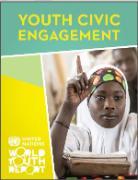
The United Nations World Youth Report will be launched at the UN Headquarters in New York on Friday, 15 July and focuses on Youth Civic Engagement in 2016. The publication is comprised of contributions from international experts including UNESCO Chair and Director of NUI Galway’s Child and Family Research Centre Professor Pat Dolan.
The report, published biennially, was commissioned in the context of an increased policy focus on youth civic engagement to counter the rise in youth radicalisation and the growing disenfranchisement among young people with traditional forms of political participation.
The United Nations World Youth Report spans economic, political and community civic engagement models. These elements, grounded in discourses over the purpose and nature of youth as citizens, highlight a number of societal benefits to better recognition of young people as contributors to the development of their communities and society. The Report calls for the development of inclusive policies and decision-making processes that facilitate meaningful engagement and active partnership by young people.
Professor Dolan said: “At a very real and human level this world youth report demonstrates that positive engagement of youth, in real ways in school and community settings, is core to future of Irish civic society, and needs and deserves fuller respect by adults including politicians. Young people when given the opportunity are equally, if not more empathic and willing than adults, and more than willing to play a positive role – youth are civic actors now and into the future.”
In a context-setting piece, UNESCO Chairs Pat Dolan and Mark Brennan of Pennsylvania State argue that perspectives that see youth as individuals with the positive motivation and skills to contribute to their communities have immediate benefits in terms of young people becoming more involved as collaborators, team members, leaders and decision makers within their communities while also setting up young people on a lifetime course of broader engagement in political and economic life.
For further information on the United Nations World Youth Report visit www.unworldyouthreport.org.
^ Hide answer
Rita Melia of the UNESCO Child and Family Research centre awarded prestigious Fulbright Award, June 16th, 2016.
On June 16th 2016, The Fulbright Commission awarded a 2016/2017 Fulbright- National University of Ireland Visiting Research Award for research in early childhood education and care at the Fulbright Awards ceremony in the American Ambassador’s Residence Phoenix Park, Dublin. This award, presented to Rita Melia NUI Galway is the first Fulbright award in the area of early childhood education and care and highlights the growing awareness of the importance of quality early childhood experiences for young children and the need for research in early childhood education and care.

^ Hide answer
‘Understanding Family Support’ Publication & Book Launch, June 2016
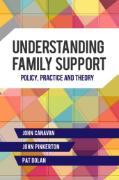 On the 29th of June 2016, the launch took place of ‘Understanding Family Support’ at Queens University Belfast. Published in London and Philadelphia by Jessica Kingsley the book is authored by the director of the UNESCO Child and Family Research centre, Prof. Pat Dolan, Associate Director, Dr. John Canavan along with Prof. John Pinkerton of Queen’s University Belfast. The book provides a definition of family support and a clear perspective on the role that it has in promoting the welfare of children and their families. It is a resource for any professional engaged in policy development, service design, delivering or evaluation of family support, including social workers, residential care staff, community development workers, teachers, community police, human services managers, evaluators and policy makers.
On the 29th of June 2016, the launch took place of ‘Understanding Family Support’ at Queens University Belfast. Published in London and Philadelphia by Jessica Kingsley the book is authored by the director of the UNESCO Child and Family Research centre, Prof. Pat Dolan, Associate Director, Dr. John Canavan along with Prof. John Pinkerton of Queen’s University Belfast. The book provides a definition of family support and a clear perspective on the role that it has in promoting the welfare of children and their families. It is a resource for any professional engaged in policy development, service design, delivering or evaluation of family support, including social workers, residential care staff, community development workers, teachers, community police, human services managers, evaluators and policy makers.
^ Hide answer
‘Hoping for a Better Tomorrow’ (Ballyhaunis Report) Launch, June 8th, 2016.
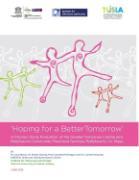 Launched at the Friary, Ballyhaunis on the 8th of June 2016, this study, which has been funded by Tusla – Child and Family Agency, highlights the significance of early year’s services in the Ballyhaunis area that are responsive, inclusive and accessible to all children and families in the region. It also looks at how both the crèche and preschool services foster principles such as respect for social and cultural diversity, inclusivity and participatory ways of working with children and families which are key in the area given the diversity of the local community. The report was authored by the UCFRC’s Dr. Lisa Moran, Dr. Sheila Garrity, Prof. Caroline McGregor and Dr. Carmel Devaney.
Launched at the Friary, Ballyhaunis on the 8th of June 2016, this study, which has been funded by Tusla – Child and Family Agency, highlights the significance of early year’s services in the Ballyhaunis area that are responsive, inclusive and accessible to all children and families in the region. It also looks at how both the crèche and preschool services foster principles such as respect for social and cultural diversity, inclusivity and participatory ways of working with children and families which are key in the area given the diversity of the local community. The report was authored by the UCFRC’s Dr. Lisa Moran, Dr. Sheila Garrity, Prof. Caroline McGregor and Dr. Carmel Devaney.
^ Hide answer
‘Philosophy and Political Engagement: Reflections in the Public Sphere’, Book Launch Friday 27th May 2016.
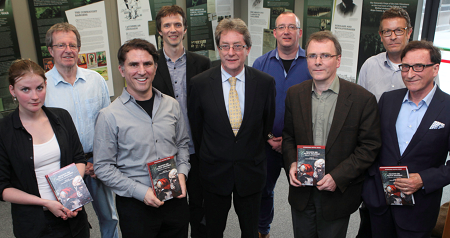
On the 27th of May 2016, The book launch of ‘Reflection in the Public Sphere’ edited by the UNESCO Child and Family Research Centre’s Dr. Allyn Fives along with Keith Breen (Queen’s University Belfast) (Palgrave, 2016) at the National University of Ireland, Galway. The volume is dedicated to Joseph Mahon to mark his retirement from NUI Galway where he taught Philosophy from 1968 – 2013. The launch took take place in the Moore Institute Seminar Room (G010), Hardiman Research Building, NUI Galway.
Pictured at the launch (left to right) are: Annie McKeown O’Donovan (Philosophy, NUI Galway), Prof Russell Keat (Edinburgh), Prof James E. Mahon (CUNY-Lehman), Dr Allyn Fives (Political Science & Sociology, UCFRC, NUI Galway), President Jimmy Browne, Dr Keith Breen (Queens’ University Belfast), Prof Felix O’Murchadha (Philosophy, NUI Galway), Dr Richard Hull (Philosophy, NUI Galway), Joseph Mahon (Philosophy, NUI Galway)
^ Hide answer
Prof. Robert J. Chaskin Guest address, April 15th, 2016: Engaging Urban Youth: Community, Citizenship, and Democracy
 The Centre welcomes Professor Robert J. Chaskin, Professor and the Deputy Dean for Strategic Initiatives at the School of Social Service Administration, and Affiliated Scholar at Chapin Hall at the University of Chicago. Professor Chaskin will be carrying out a two year Marie Curie Fellowship with the centre from 2016-2018. His research interests include community organizing and development, community social organization, comprehensive community initiatives, youth development, associations and nonprofits, philanthropy and social change, social housing policy, knowledge utilization and evaluation, and cross-national research. On the 15th of April, as part of the Lunchtime seminars, Professor Chaskin gave an address on Engaging Urban Youth: Community, Citizenship, and Democracy.
The Centre welcomes Professor Robert J. Chaskin, Professor and the Deputy Dean for Strategic Initiatives at the School of Social Service Administration, and Affiliated Scholar at Chapin Hall at the University of Chicago. Professor Chaskin will be carrying out a two year Marie Curie Fellowship with the centre from 2016-2018. His research interests include community organizing and development, community social organization, comprehensive community initiatives, youth development, associations and nonprofits, philanthropy and social change, social housing policy, knowledge utilization and evaluation, and cross-national research. On the 15th of April, as part of the Lunchtime seminars, Professor Chaskin gave an address on Engaging Urban Youth: Community, Citizenship, and Democracy.
^ Hide answer
14th Child and Family Welfare Network Event: Dr. Linda Liebenberg, 10th February 2016.
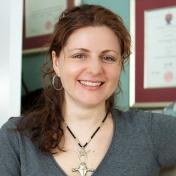 On the 10th of February 2016, the Centre welcomed Dr Linda Liebenberg to speak at the UCFRC 14th Child and Family Network Event. Dr Liebenberg is a leading researcher and evaluator in the field of youth resilience and community development, with a core interest in children and youth with complex needs. Her work explores the promotion of positive youth development and mental health, using formal and informal processes of resilience. In her address, Dr. Leibenberg discussed a substantial research project in rural Canada which reconsiders the practice of Social Work and its relationship to those it aims to assist. The seminar refers back to its fundamental questioning regarding the risks of an over-focus on ‘professionalism’ and the undervalued potential of informal social support. She highlighted the need for social work to remain focused on its values in an attempt to find solutions when interacting with the needs of individuals, families and communities remaining open minded to the possibility that these solutions may be provided in an informal manner.
On the 10th of February 2016, the Centre welcomed Dr Linda Liebenberg to speak at the UCFRC 14th Child and Family Network Event. Dr Liebenberg is a leading researcher and evaluator in the field of youth resilience and community development, with a core interest in children and youth with complex needs. Her work explores the promotion of positive youth development and mental health, using formal and informal processes of resilience. In her address, Dr. Leibenberg discussed a substantial research project in rural Canada which reconsiders the practice of Social Work and its relationship to those it aims to assist. The seminar refers back to its fundamental questioning regarding the risks of an over-focus on ‘professionalism’ and the undervalued potential of informal social support. She highlighted the need for social work to remain focused on its values in an attempt to find solutions when interacting with the needs of individuals, families and communities remaining open minded to the possibility that these solutions may be provided in an informal manner.
^ Hide answer
Galway School 2015: ‘Child Rights in Practice’: Realising children’s rights through empowering parents and families’
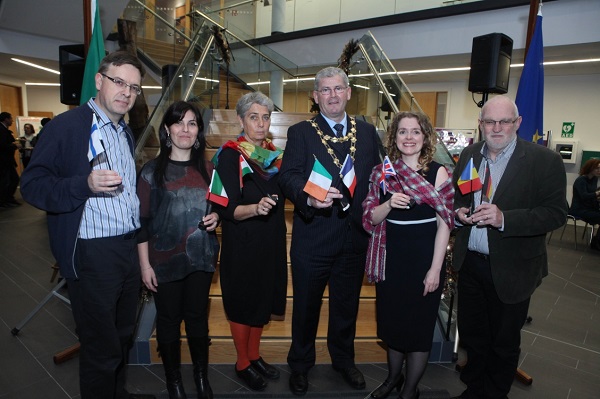
Left to Right: Dr. John Canavan (Unesco Child and Family Research Centre, NUI Galway), Ms. Agatta D’Addato (Eurochild), Dr. Maria Herczog (Eurochild), Cllr. Frank Fahy (Galway Mayor), Ms. Georgette Mulheir (Lumos), Professor. Pat Dolan (Unesco Child and Family Research Centre, NUI Galway)
From the 1st to the 4th of December 2015, Eurochild, UNESCO Chairs Global Network, Council of Europe and UNICEF Office of Research -Innocenti took the opportunity to organise this first edition of the Galway School ‘Child Rights in Practice and Research’, focusing on family and parenting support in the context of realising children’s rights.
Hosted by the UNESCO Child and Family Research centre at the Institute for Lifecourse and Society, this closed expert meeting brought together 70 ‘policy-literate’ practitioners and researchers from across Europe to explore concepts and shared practices, recognising the enormous value of learning from other countries and cultures and from the different perspectives of academia, policy and practice.
The four overarching objectives of the school was to gain knowledge and understanding on how family support impacts on the realisation of children’s rights in practice, underpinned by the UN Convention on the Rights of the Child (UNCRC) and Council of Europe Recommendation on Policy to Support Positive Parenting, to build the capacity of delegates to focus on how to (a) build the evidence (b) present the evidence and (c) engage with and influence policy makers, to share ‘inspiring practices’ from across Europe in integrated family support services and to strengthen collaboration and exchange among practitioners and researchers in children’s rights across Europe.
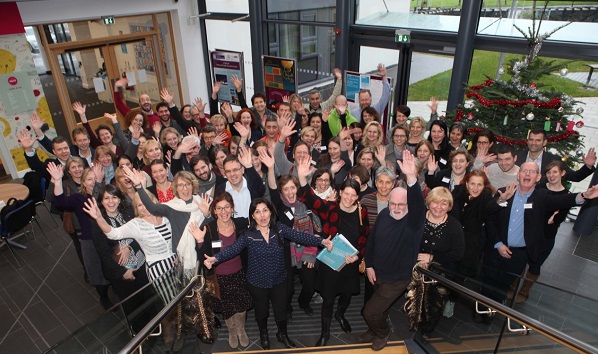 Conference Attendees Group Photo
Conference Attendees Group Photo
^ Hide answer
President Michael D Higgins gives inaugural lecture at the Launch of the Institute for Lifecourse and Society, Monday 30th November 2015
 On Monday 30 November 2015, President Michael D Higgins gave the inaugural lecture marking the official launch of the Institute for Lifecourse and Society (ILAS), following the Tánaiste’s visit to open the Institute less than two weeks before. An NUI Galway alumnus, President Higgins congratulated the university on the “splendid building” that is the Institute for Lifecourse and Society and paid tribute to the “breadth and depth” of research that is conducted within it by its 150-strong team of staff, “a formidable resource” led by Professor Pat Dolan.
On Monday 30 November 2015, President Michael D Higgins gave the inaugural lecture marking the official launch of the Institute for Lifecourse and Society (ILAS), following the Tánaiste’s visit to open the Institute less than two weeks before. An NUI Galway alumnus, President Higgins congratulated the university on the “splendid building” that is the Institute for Lifecourse and Society and paid tribute to the “breadth and depth” of research that is conducted within it by its 150-strong team of staff, “a formidable resource” led by Professor Pat Dolan.
Stressing the importance of the ILAS centre’s “capacity to cooperate across disciplines”, President Higgins described the Institute as “a response to a fundamental issue” that has existed in Ireland since the formation of the State, socioeconomic inequality, and highlighted that one of the centre’s “great strengths” is its “strong emphasis on civic engagement”. Coinciding with the 50th anniversary of NUI Galway’s social sciences research centre, President Higgins’s lecture was inspired by his personal reflection on the enormous shift in social action and policy that has taken place since the college first opened as UCG; he said he found it “greatly inspiring to witness the real will that exists to envision a new version of citizenship, one that is fair and equitable and allows all its people to flourish.”
A notable academic, President Higgins also remarked on the “interdisciplinary character” of the Institute, and encouraged it to maintain its interest in “strong theoretical work”, while warning that to abandon work grounded in thorough academic research would be “disastrous” for all who participate in it.Throughout his lecture, President Higgins repeatedly highlighted the distinction between “craft” and “science”, questioning which is more effective at a human level, and outlined his hopes that the Lifecourse Institute would be “an exercise of empowerment” for young people that would give way to “a new form of contemporary literacy” and re-engage “young scholars”. In the latter half of his talk, President Higgins explored what he believes to be “welcome signs of change”, including the impending introduction of politics and society as a Leaving Certificate subject in 2016, a change he feels will foster future generations’ capacity for “transformative thinking”.
Repeating the importance of “crafting” in the Lifecourse Institute’s work (marrying theoretical research grounded by academia with a practical approach that embraces “the fullness of the person”), President Higgins revealed his hope that all who work in the ILAS centre are joyful in their approach to their practice, and that their work will lead to a better, more cohesive society in modern-day Ireland.Renowned nationwide for his all-encompassing vision and perspective, President Higgins’s lecture did not just focus on the Lifecourse Institute and the work conducted within it; his talk was grounded in global issues such as the role of the State, economic policy, the migration crisis in the E.U., and the rise of extremism.
Contrasting the holistic approach taken by ILAS-based researchers, President Higgins expressed his frustration at what he perceives as a lack of an interdisciplinary approach worldwide, outlining his belief that society’s response to the suffering of individuals must be “immediate”, while also recognising that their “right has been denied”, and supported by a “clear vision” for progression.
Concluding, President Higgins reflected on the recent Paris attacks, and accepted that we live in “a time of understandable fear”, but encouraged all present to “face up to tough choices”, to “seize the opportunity to work together”, and not to “let words become empty”. He reminded the audience that “the participation of citizenship was at the centre of the republicanism” that led to the founding of the Irish State; that “a true republic” should be judged on how it meets the needs of its people, “and of the stranger,” particularly as we approach the centenary of the 1916 Rising.
View the speech in full here: https://www.youtube.com/watch?v=d1MpPc6Hz7g
^ Hide answer
Prof. Daniel Russel and Dr. Carolyn Cutrona: Current Issues in Social Support Seminar November 24th 2015
On November 24th 2015, the Centre welcomed Professor Dan Russel and Dr. Carolyn Cutrona of Iowa State University to speak as part of the Centre’s lunchtime seminar series 2015. The seminar, entitled ‘Current Issues in Social Support’ provided the central discussion point for the seminar along with a breadth of issues in relation to support and resilience. Prof. Russell is a research associate at the UNESCO Child and Family Research Centre, and has provided training to the team on advanced quantitative research methods. Dr. Cutrona is the chair of the Department of Psychology at the Iowa State University and in the past has worked on numerous projects with members of the Centre also.
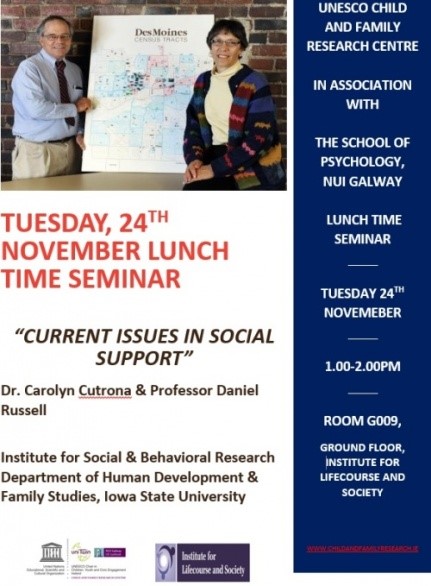
^ Hide answer
UNESCO Chair Professor Pat Dolan and Cillian Murphy actor and patron of the UNESCO Child and Family Research centre meet with Irina Bokova Director General of UNESCO 9th Nov 2015

‘Youth as Researchers – Invoking Empathy and Activating Young Peopl'e was the title of a public conversation NUI Galway’s UNESCO Chair, Professor Pat Dolan conducted at the biennial UNESCO Youth Forum in Paris from October 26th to October 28th. The Chair hosted the session which featured youth researchers, trained by the UNESCO Child and Family Research Centre in conversation with Irish actor Cillian Murphy, who is patron of the Centre on the theme of activating youth voice through film and youth-led research.
The session also included the launch by Cillian Murphy of two videos documenting the findings of youth researcher projects – one on mental health awareness and the other on the challenges facing LGBT youth on projects undertaken by representatives of Foróige, Ireland’s leading youth work organisation in association with the actor earlier in the year.
According to the actor “Ensuring the voice of young people is present in matters directly affecting them is an issue close to my heart. Research driven by youth can build on their capacity and enable them to add their voice and influence change on issues that matter to them”.
The event highlighted the Youth as Researchers element of the UNESCO Chair’s work at NUI Galway. The Youth Researchers Programme is focused on training young people to undertake research across a number of areas on issues affecting their lives. The projects featured built on the work undertaken by the Foróige youth organisation research teams that emerged from youth researcher trainings conducted by the Child and Family Research Centre in early 2015. These are accompanied by the development of a Youth Researcher Training Manual and Workbook that have been used widely in youth organisation and clubs.
The short films are part of a broader initiative within the UCFRC to develop a programme to promote empathy in youth. Centre Director and UNESCO Chair Professor Pat Dolan believes that empathy education should begin in school: “There is a role for taught, value-based empathy education in the school curriculum and in helping to understand diversity and difference”.
Also at the Forum, the UCFRC showcased its research partnership with the Lumos Foundation in the UK, founded by author JK Rowling in an effort to increase global momentum to reduce the number of children living in institutions. An interactive session presented by young people with disabilities from Eastern Europe hosted by CEO of Lumos Georgette Mulheir, Professor Pat Dolan, and UNESCO Chair Professor Mark Brennan demonstrated the importance of self-advocacy and new styles of participation which will bring about real inclusion.
^ Hide answer
A New Research Partnership between J.K. Rowling’s International Children’s Organisation Lumos and NUI Galway
 On July 2, 2015, the UNESCO Child and Family Research Centre (UCFRC) announced a research partnership with the Lumos Foundation founded by the author J.K. Rowling. Lumos is a renowned international foundation working to end the institutionalisation of children around the world by transforming the education, health and social care systems toward family-based care and/or foster care.
On July 2, 2015, the UNESCO Child and Family Research Centre (UCFRC) announced a research partnership with the Lumos Foundation founded by the author J.K. Rowling. Lumos is a renowned international foundation working to end the institutionalisation of children around the world by transforming the education, health and social care systems toward family-based care and/or foster care.
The partnership builds on the expertise of the UCFRC in prevention and early intervention, its track record in applied research and policy change, and its international reputation in Family Support and Youth Development. It incorporates the UCFRC’s extensive network of relationships particularly the Global Network of UNESCO Chairs in Children, Youth and Communities led by Professors Pat Dolan and Mark Brennan at Pennsylvania State University. The partnership is founded on a set of common goals including family support as a fundamental orientation that encompasses efforts to develop, compensate for, enable and strengthen family functioning; finding practical, cost-effective and sustainable ways to support families and children; and directing resources to evidence-based prevention and early intervention services.
An estimated eight million children worldwide live in institutions of whom at least 80% have living parents. Lumos has worked in Moldova, Bulgaria and the Czech Republic to replace models of care based on institutions with education, health and social services to support vulnerable families to stay together in the community and, more recently has undertaken work in Ukraine, Serbia and Haiti.
The research collaboration between the UCFRC and Lumos aims to increase global understanding of why so many children are separated from families and placed in orphanages in different regions of the world, evaluate methods of deinstitutionalisation, and investigate the best ways to support families to stay together.
The research programme will:
• Monitor the impact of moving from institutions to family based care on children and young people as they grow up in terms of health, quality to life and future chances;
• Evaluate ten years of Lumos’ work in its programme countries;
• Identify best practice for achieving the deinstitutionalisation of children across different regions of the world;
• Explore the cost-benefit in different regions of the world of replacing institutions with community based services;
• Develop models for advancing the work of Lumos in new regions around the world such as South East Asia and Sub-Saharan Africa.
Thanks to a generous grant from The Atlantic Philanthropies, the partnership will start its activities by establishing links and learning opportunities between Irish examples of best practice, much of it also supported by Atlantic, and governments and practitioners in countries in the process of reforming systems of care and protection of children.
Announcing the partnership, Lumos CEO Georgette Mulheir said “Our mission is to help eight million children in institutions by promoting large-scale reform through our influence on governments and major international aid donors. We need compelling evidence to achieve the greatest impact. We are delighted to work with NUI Galway, which will bring world-leading independent academic rigour to our programmes – as well as an understanding of what works in practice to gain the best outcomes for children.”
The UNESCO Chair Professor Pat Dolan who will work on the project with UNESCO Chair Professor Mark Brennan at Pennsylvania State University in the US said “The prospect of completing usable real-world research that helps to end the institutionalisation of children and youth globally, will be particularly fitting not only for UNESCO, and our research centre in NUI Galway, but for Ireland as a country given its sad and horrific past track record in relation to children in large orphanages."
Find out more about the research in The Irish Times, Irish Examiner and RTÉ’s Morning Ireland.
^ Hide answer
A Youth Perspective on the Marriage Equality Referendum, 14th May 2015
Ailish Gowran, a 16-year-old transition year student gives her opinion on the marriage equality referendum. She wrote this article during her time as a youth researcher at the UNESCO Child and Family Research Centre, NUI Galway.
If other young people are interested in campaigning for a Yes vote they can through the BeLonGToYES coalition, comprising 14 youth and children's organisations, including the National Youth Council of Ireland, Foróige, Youth Work Ireland and EPIC. If you would like to get involved, and do what you can for a YES vote on May 22nd, then check out www.belongto.org. A copy of Ailish's opinion peice can be dowloaded from here-Youth Perspective on Marriage Ref
^ Hide answer
Statement on Marriage Referendum from Pat Dolan and Cillian Murphy of the UNESCO Child and Family Research Centre, 7th May 2015
The forthcoming same sex marriage referendum relates to adults’ human right to marry whom they chose regardless of sexual orientation. Divisive negative issues raised in relation to children and their welfare are being used to deflect from the core question in the referendum. The position of the UNESCO Child and Family Research Centre at NUI Galway and its patron is that the most essential factor for a child or adolescent is that they have a loving, consistent and caring parent or parents who cater for their physical, intellectual, emotional, and social needs. This point of view is supported by a wealth of well-respected international research.
The Centre’s position is the achievement of young people’s rights requires that their hopes and wishes for their future be realised regardless of their sexual orientation, and inclusive of their rights to marry. Despite the fact that our centre has trained young researchers with a view on this matter, it is notable that just as in the case of the Children’s Referendum in 2013, the voice and opinion of young people is in the main absent in the discourse, despite adults purporting to represent their interests.
Professor Pat Dolan, Director
Cillian Murphy, Patron
The UNESCO Child and Family Research Centre at NUI Galway
Irish Times Article
^ Hide answer
Alan Kerins Projects Celbrates 10 Years Anniversary at ILAS, 10th Mar 2015
A Galway based development charity marked it’s landmark 10th anniversary with an emotional and heartfelt birthday celebration at the city’s state of the art new Institute for Lifecourse and Society Institute building at NUI Galway, last month.
Close to 200 friends and invited guests joined founder and board members of The Alan Kerins Project for the occasion, which was also attended by the Minister for Development and Trade Sean Sherlock, the Lord Mayor of Galway Cllr Donal Lyons, by local senator Lorraine Higgins, and by other elected representatives and dignitaries.
The event was one of the first to take place in the new Lifecourse and Society Institute, a facility that was lauded by Minister Sherlock as “a fantastic new learning facility” on the Galway campus.
The occasion allowed charity-founder Alan Kerins to pay tribute and honour many of those who had supported him in the first decade of his organisation.
And on hand to receive such acknowledgements were Fr Dan Joe O’Mahony, whom Alan Kerins described as ‘a mentor and inspiration’, and the two Irish Presentation Sisters - Sr. Cathy Crawford and Sr. Molly Maloney, whose work The Alan Kerins Projects has been supporting in Western Zambia for the past 10 years.
Alan Kerins Projects also used the occasion to announce an exciting new partnership with Irish development organisation Gorta-Self Help Africa, which Alan said would allow them to do more work and reach more people in Zambia in the years ahead.
Gorta-Self Help Africa chairman Tom Kitt, a Galwegian and former Minister at the Dept of Foreign Affairs himself said that the organisation would achieve a lot more together, and that he looked forward to working closely with Alan and his Galway supporters in the future.
There was a large representation from across the local community at the recent 10th anniversary celebration, as well as many of the committed and dedicated volunteers who had supported the work of Alan Kerins Projects (AKP) by staging events, supporting events and by volunteering with AKP in Zambia in that time.
Thanks were also expressed to the dedicated board of directors led by chariperson Jacqui O’Grady, who had provided leadership to AKP through the years.
^ Hide answer
Mairead McGuinness MEP visits ILAS, 20th Febuary 2015
On the 20th of February 2015, Mairead McGuinness MEP Brussels met with Eileen Lauster of the Responding to Child to Parent Violence (RCPV) Project at the UNESCO Child and Family Research Centre and with other researchers at the Institute for Lifecourse and Society to talk about the RCPV project and the work and aims of the Institute.
Mairead is a Vice-President of the European Parliament and was also appointed Children's Rights Mediator. Pierce and Sinead from the Centre for Disability Law and Policy (CDLP) were able to attend the meeting and Emily O'Donnell in the UNESCO CFRC gave a very informative tour of the facility on the day.  Pictured L-R are: Piers Gooding (Research Associate, CDLP); Eileen Lauster (RCPV Project); Mairead McGuinness; Sinéad Keogh (Post-Doctoral Researcher, CDLP)
Pictured L-R are: Piers Gooding (Research Associate, CDLP); Eileen Lauster (RCPV Project); Mairead McGuinness; Sinéad Keogh (Post-Doctoral Researcher, CDLP)
^ Hide answer
Director-General of UNESCO, Irina Bokova meets UNESCO Chairs in Paris
UNESCO Chairs, Professor Pat Dolan, UNESCO Chair in Children, Youth and Civic Engagement at NUI Galway and Professor Mark Brennan, UNESCO Chair in Community, Leadership, and Youth Development at Pennsylvania State University updated the Director-General of UNESCO, Irina Bokova on recent activities of a Global Network of UNESCO Chairs on Children, Youth and Community and planned engagement in the 9th UNESCO Youth Forum taking place in November 2015, as an integral part of the 38th session of the UNESCO General Conference.
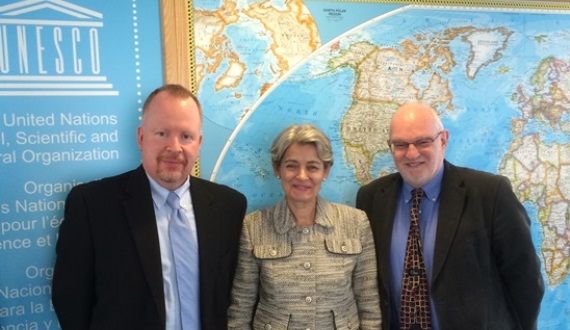
Pictured (L-R) are: Professor Mark Brennan, Ms Irina Bokova, Professor Pat Dolan.
^ Hide answer
Advancing Best Practices in Child Abuse and Neglect: A Multi-Disciplinary Perspective, 22nd Jan 2015
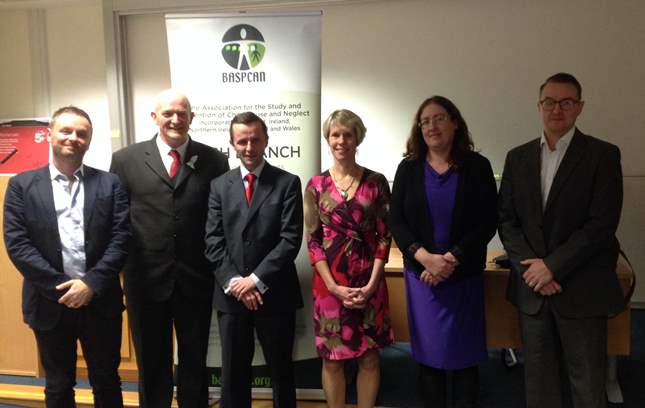
Pictured (L-R) are: Dr. Declan Coogan, Lecturer in MA Social Work at NUI Galway; Colm Dempsey, current Acting-Chair of the Irish branch of BASPCAN; Dr. Geoffrey Shannon, the State Special Rapporteur on Child Protection; Dr. Joanne Nelson, the Clinical Director of the Child and Adolescent Sexual Assault Treatment Service HSE West, Professor Caroline McGregor, Director of MA in Social Work programme at NUI Galway, Joseph Mooney, Doctoral Researcher with the UNESCO Child and Family Research Centre, NUI Galway.
This was the third in a series of national events to launch the Irish Branch of BASPCAN to the Western seaboard region. Other events included the national launch held at Trinity College on April 11th, 2014 opened by Dr. John Devany OBE, Queens University Belfast, and a regional launch in the south of Ireland held at the Bessborough Centre on September 26th, 2014.
BASPCAN, the British Association for the Study and Prevention of Child Abuse and Neglect was founded in the UK in 1979 and is a registered charity which aims to prevent physical, emotional and sexual abuse and neglect of children by promoting the physical, emotional, and social well-being of children (www.baspcan.org.uk).
The launch of an Irish branch of BASPCAN aims to bring together professionals, academics, voluntary, NGO and State organisations with a view to raising awareness of child abuse and neglect and also to create a multi-disciplinary environment in which the current and lasting issues in this area can be debated and discussed.
The regional launch in Galway presented the latest research, policy and frontline experience from Dr. Geoffrey Shannon, the State Special Rapporteur on Child Protection, Dr. Joanne Nelson, the Clinical Director of the Child and Adolescent Sexual Assault Treatment Service HSE West, and Professor Caroline McGregor, Director of the MA in Social Work programme at NUI Galway.
The event was organised by Colm Dempsey, current Acting-Chair of the Irish branch of BASPCAN, Dr. Declan Coogan, Lecturer at NUI Galway, and Joseph Mooney, Doctoral Researcher with the UNESCO Child and Family Research Centre, NUI Galway. The event was kindly supported by the UNESCO Child and Family Research Centre and the Institute for Life Course and Society, NUI Galway. The event was free of charge and was open to all interested parties.
^ Hide answer
10 January 2024
Broadening the debate: Understanding the social context of youth mental health
10 January 2024
Broadening the debate: Understanding the social context of youth mental health



-(1)-112x180.jpg)

.bmp)











 Our team actively supports youth to engage in research on issues of interest to them. Supporting youth to lead on research projects positively contributes to their development, enhancing their skill set and empowering them to investigate and take action on issues of relevance to their lives. Ciara Beth designed, developed and trialled ‘a discrete social prompt’ in the form of a phone app to help children with Autism. The app has a simple yet intricate alarm and prompt function to remind children with Autism to make eye contact. Development of the app was made possible through support and training from Eoin Dolan, Foroige Soundsufers and Jen Hesnan, Techspace programme, which aims to encourage young people between the ages of 10 and 18 to be media creators as well as consumers. Thanks also to our Patron Cillian Murphy for letter of support for Ciara Beth's application.Given that according to recognised experts in the field of Autism generally and supporters of Applied Behavioural Analysis (ABA) most particularly, eye contact enhancement is a key aspect of social communication for young people on the Autism spectrum, the creation of this concise instrument by Ciara Beth is not just innovative but particularly timely.
Our team actively supports youth to engage in research on issues of interest to them. Supporting youth to lead on research projects positively contributes to their development, enhancing their skill set and empowering them to investigate and take action on issues of relevance to their lives. Ciara Beth designed, developed and trialled ‘a discrete social prompt’ in the form of a phone app to help children with Autism. The app has a simple yet intricate alarm and prompt function to remind children with Autism to make eye contact. Development of the app was made possible through support and training from Eoin Dolan, Foroige Soundsufers and Jen Hesnan, Techspace programme, which aims to encourage young people between the ages of 10 and 18 to be media creators as well as consumers. Thanks also to our Patron Cillian Murphy for letter of support for Ciara Beth's application.Given that according to recognised experts in the field of Autism generally and supporters of Applied Behavioural Analysis (ABA) most particularly, eye contact enhancement is a key aspect of social communication for young people on the Autism spectrum, the creation of this concise instrument by Ciara Beth is not just innovative but particularly timely. 

 On the 29th of June 2016, the launch took place of ‘Understanding Family Support’ at Queens University Belfast. Publishe
On the 29th of June 2016, the launch took place of ‘Understanding Family Support’ at Queens University Belfast. Publishe Launched at the Friary, Ballyhaunis on the 8th of June 2016, this study, which has been funded by Tusla – Child and Family Agency, highlights the significance of early year’s services in the Ballyhaunis area that are responsive, inclusive and accessible to all children and families in the region. It also looks at how both the crèche and preschool services foster principles such as respect for social and cultural diversity, inclusivity and participatory ways of working with children and families which are key in the area given the diversity of the local community. The report was authored by the UCFRC’s Dr. Lisa Moran, Dr. Sheila Garrity, Prof. Caroline McGregor and Dr. Carmel Devaney.
Launched at the Friary, Ballyhaunis on the 8th of June 2016, this study, which has been funded by Tusla – Child and Family Agency, highlights the significance of early year’s services in the Ballyhaunis area that are responsive, inclusive and accessible to all children and families in the region. It also looks at how both the crèche and preschool services foster principles such as respect for social and cultural diversity, inclusivity and participatory ways of working with children and families which are key in the area given the diversity of the local community. The report was authored by the UCFRC’s Dr. Lisa Moran, Dr. Sheila Garrity, Prof. Caroline McGregor and Dr. Carmel Devaney. 
 The Centre welcomes Professor Robert J. Chaskin, Professor and the Deputy Dean for Strategic Initiatives at the School of Social Service Administration, and Affiliated Scholar at Chapin Hall at the University of Chicago. Professor Chaskin will be carrying out a two year Marie Curie Fellowship with the centre from 2016-2018. His research interests include community organizing and development, community social organization, comprehensive community initiatives, youth development, associations and nonprofits, philanthropy and social change, social housing policy, knowledge utilization and evaluation, and cross-national research. On the 15th of April, as part of the Lunchtime seminars, Professor Chaskin gave an address on Engaging Urban Youth: Community, Citizenship, and Democracy.
The Centre welcomes Professor Robert J. Chaskin, Professor and the Deputy Dean for Strategic Initiatives at the School of Social Service Administration, and Affiliated Scholar at Chapin Hall at the University of Chicago. Professor Chaskin will be carrying out a two year Marie Curie Fellowship with the centre from 2016-2018. His research interests include community organizing and development, community social organization, comprehensive community initiatives, youth development, associations and nonprofits, philanthropy and social change, social housing policy, knowledge utilization and evaluation, and cross-national research. On the 15th of April, as part of the Lunchtime seminars, Professor Chaskin gave an address on Engaging Urban Youth: Community, Citizenship, and Democracy. On the 10th of February 2016, the Centre welcomed Dr Linda Liebenberg to speak at the UCFRC 14th Child and Family Network Event. Dr Liebenberg is a leading researcher and evaluator in the field of youth resilience and community development, with a core interest in children and youth with complex needs. Her work explores the promotion of positive youth development and mental health, using formal and informal processes of resilience. In her address, Dr. Leibenberg discussed a substantial research project in rural Canada which reconsiders the practice of Social Work and its relationship to those it aims to assist. The seminar refers back to its fundamental questioning regarding the risks of an over-focus on ‘professionalism’ and the undervalued potential of informal social support. She highlighted the need for social work to remain focused on its values in an attempt to find solutions when interacting with the needs of individuals, families and communities remaining open minded to the possibility that these solutions may be provided in an informal manner.
On the 10th of February 2016, the Centre welcomed Dr Linda Liebenberg to speak at the UCFRC 14th Child and Family Network Event. Dr Liebenberg is a leading researcher and evaluator in the field of youth resilience and community development, with a core interest in children and youth with complex needs. Her work explores the promotion of positive youth development and mental health, using formal and informal processes of resilience. In her address, Dr. Leibenberg discussed a substantial research project in rural Canada which reconsiders the practice of Social Work and its relationship to those it aims to assist. The seminar refers back to its fundamental questioning regarding the risks of an over-focus on ‘professionalism’ and the undervalued potential of informal social support. She highlighted the need for social work to remain focused on its values in an attempt to find solutions when interacting with the needs of individuals, families and communities remaining open minded to the possibility that these solutions may be provided in an informal manner.
 Conference Attendees Group Photo
Conference Attendees Group Photo On Monday 30 November 2015, President Michael D Higgins gave the inaugural lecture marking the official launch of the Institute for Lifecourse and Society (ILAS), following the Tánaiste’s visit to open the Institute less than two weeks before. An NUI Galway alumnus, President Higgins congratulated the university on the “splendid building” that is the Institute for Lifecourse and Society and paid tribute to the “breadth and depth” of research that is conducted within it by its 150-strong team of staff, “a formidable resource” led by Professor Pat Dolan.
On Monday 30 November 2015, President Michael D Higgins gave the inaugural lecture marking the official launch of the Institute for Lifecourse and Society (ILAS), following the Tánaiste’s visit to open the Institute less than two weeks before. An NUI Galway alumnus, President Higgins congratulated the university on the “splendid building” that is the Institute for Lifecourse and Society and paid tribute to the “breadth and depth” of research that is conducted within it by its 150-strong team of staff, “a formidable resource” led by Professor Pat Dolan.

 On July 2, 2015, the UNESCO Child and Family Research Centre (UCFRC) announced a research partnership with the Lumos Foundation founded by the author J.K. Rowling. Lumos is a renowned international foundation working to end the institutionalisation of children around the world by transforming the education, health and social care systems toward family-based care and/or foster care.
On July 2, 2015, the UNESCO Child and Family Research Centre (UCFRC) announced a research partnership with the Lumos Foundation founded by the author J.K. Rowling. Lumos is a renowned international foundation working to end the institutionalisation of children around the world by transforming the education, health and social care systems toward family-based care and/or foster care.



